
Title: Ruth of Boston: A Story of the Massachusetts Bay Colony
Author: James Otis
Release date: November 3, 2013 [eBook #44100]
Most recently updated: October 23, 2024
Language: English
Credits: Produced by Melissa McDaniel and the Online Distributed
Proofreading Team at http://www.pgdp.net (This file was
produced from images generously made available by The
Internet Archive)
Transcriber's Note:
Obvious typographical errors have been corrected. Inconsistent spelling and hyphenation in the original document have been preserved.

A Story of the Massachusetts Bay Colony
BY
JAMES OTIS

NEW YORK -:- CINCINNATI -:- CHICAGO
AMERICAN BOOK COMPANY
Copyright, 1910 by
JAMES OTIS KALER
Entered at Stationers' Hall, London
The purpose of this series of stories is to show the children, and even those who have already taken up the study of history, the home life of the colonists with whom they meet in their books. To this end every effort has been made to avoid anything savoring of romance, and to deal only with facts, so far as that is possible, while describing the daily life of those people who conquered the wilderness whether for conscience sake or for gain.
That the stories may appeal more directly to the children, they are told from the viewpoint of a child, and purport to have been related by a child. Should any criticism be made regarding the seeming neglect to mention important historical facts, the answer would be that these books are not sent out as histories,—although it is believed that they will awaken a desire to learn more of the building of the nation,—and only such incidents as would be particularly noted by a child are used. 4
Surely it is entertaining as well as instructive for young people to read of the toil and privations in the homes of those who came into a new world to build up a country for themselves, and such homely facts are not to be found in the real histories of our land.
James Otis.
| PAGE | |
| A Proper Beginning | 9 |
| On the Broad Ocean | 11 |
| Making Ready for Battle | 13 |
| The Rest of the Voyage | 15 |
| The First View of America | 17 |
| The Town of Salem | 19 |
| Other Villages | 21 |
| Visiting Salem | 22 |
| Making Comparisons | 25 |
| An Indian Guest and Other Visitors | 27 |
| A Christening and a Dinner | 30 |
| Deciding upon a Home | 33 |
| A Sad Loss | 35 |
| Rejoicing Turned into Mourning | 36 |
| Thanksgiving Day in July | 38 |
| Leaving Salem for Charlestown | 39 |
| Our Neighbors | 40 |
| Getting Settled | 42 |
| The Great Sickness | 44 |
| Moving the Town | 46 |
| Master Graves Prohibits Swimming | 48 |
| Anna Foster's Party | 49 |
| The Town of Boston | 51 |
| Guarding against Fires | 53 |
| Our Own New Home | 54 6 |
| The Fashion of the Day | 56 |
| My Own Wardrobe | 59 |
| Master Johnson's Death | 60 |
| Many New Kinds of Food | 61 |
| The Supply of Food | 64 |
| The Sailing of the "Lyon" | 66 |
| The Famine | 67 |
| The Search for Food | 69 |
| The Starvation Time | 70 |
| A Day to Be Remembered | 73 |
| The Coming of the "Lyon" | 74 |
| Another Thanksgiving Day | 75 |
| A Defense for the Town | 78 |
| The Problem of Servants | 79 |
| Chickatabut | 80 |
| Building a Ship | 82 |
| Household Conveniences | 84 |
| How the Work is Divided | 86 |
| Launching the Ship | 88 |
| Master Winthrop's Mishap | 90 |
| New Arrivals | 92 |
| Another Famine | 94 |
| Fine Clothing Forbidden | 96 |
| Our First Church | 97 |
| A Troublesome Person | 100 |
| The Village of Merry Mount | 101 |
| Punishing Thomas Morton | 102 |
| Philip Ratcliff's Crime | 105 |
| In the Pillory | 107 |
| Stealing from the Indians | 108 |
| The Passing of New Laws | 110 7 |
| Master Pormont's School | 112 |
| School Discipline | 114 |
| Other Tools of Torture | 116 |
| Difficult Lessons | 118 |
| Other Schools | 119 |
| Raising Flax | 121 |
| Preparing Flax | 123 |
| Spinning, Bleaching, and Weaving Flax | 125 |
| What We Girls Do at Home | 127 |
| Making Soap | 129 |
| Soap from Bayberries | 132 |
| Goose-picking | 133 |
| A Change of Governors | 135 |
| The Flight of Roger Williams | 136 |
| Sir Harry Vane | 138 |
| Making Sugar | 140 |
| A "Sugaring Dinner" | 143 |
| Training Day | 146 |
| Shooting for a Prize | 149 |
| Lecture Day | 151 |
| Punishment for Evil-doers | 152 |
| The Murder of John Oldham | 154 |
| Savages on the War-path | 156 |
| Pequot Indians | 158 |
RUTH OF BOSTON
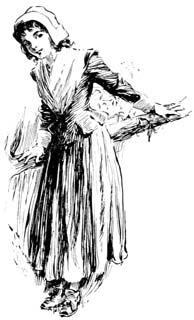
Truly it seems a great undertaking to journey from London into the land of America, yet I have done so, and because of there being very few girls only twelve years of age who are likely to make such a voyage, it seems to me well if I set down those things which I saw and did that might be interesting to myself in the future, when I shall have grown to be an old lady, if God permits, or to any other who may come upon this diary.
Of course I must first set down who I am, in case strangers should some day chance to find this book, and, growing interested in it—for who can say that I may not be able to tell a story which shall be entertaining, because of there being in it much which the people of England have never 10 seen—give me credit for having written a diary without a proper beginning.
You must know, then, that my name is Ruth. In the year of our Lord, 1630, when, as I have said, I was but twelve years of age, my father joined that company led by Master John Winthrop, whose intent it was to go into America to spread the gospel, and there also build up a town wherein should live only those who were one with them in the worship of God.
This company was made up of four classes of people. First there were those who paid a sum of money for their passage to America, and, because of having done so, were to be given a certain number of acres of land in the New World.
In the second class were those who, not having enough money to pay the full price for their passage, agreed to perform a sufficient amount of work, after arriving in America, to make up for the same.
In the third class were those called indentured servants, which is much the same as if I said apprentices.
The fourth and last class had in it those people who were to work for wages, at whatsoever trade or calling they were best fitted.
It needs not that I should say more by way of a beginning, for surely all the people in England, if they do not know it now, will soon come to understand why we, together with those who have gone before us, and 11 the companies that are to come after, have journeyed into America.
It was decided that my parents, and, of course, myself, should sail in the same ship with Master Winthrop, and the name of that vessel was the Arabella, she having been so called in honor of Lady Arabella Johnson, who journeyed with us.
My mother was sadly grieved because of Mistress Winthrop's deciding not to go on the voyage with her husband, but to join him in the New World later, and this decision was a disappointment to very many of the company. I am in doubt as to whether the Lady Arabella would have gone with us on this ship, had she not believed Mistress Winthrop also was to go.
It was on the twenty-second day of March, in that year which I have previously set down, that, having already journeyed from London to Southampton, we went aboard the Arabella, counting that the voyage would be begun without delay, and yet, because of unfriendly winds and cruel storms, our ship, with three others of the company, lay at anchor until the eighth day of April.
Then it was, after the captain of the ship had shot off three guns as a farewell, that we sailed out on the 12 broad ocean, where we were tossed by the waves and buffeted by the winds for nine long, dreary weeks.
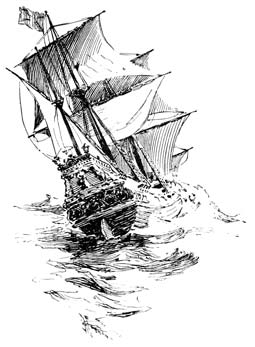
Had it not been for Master Winthrop's discourses day after day, we should have been more gloomy than we were; but with such a devout man to remind us of the mercy and goodness of God, it would have been little short of a sin had we repined because of not being carried more speedily to that land where was to be our home.
There was one day during the voyage, when it seemed verily as if the Lord was not minded we should journey away from England.
We had not been out from the port many days, when on a certain morning eight ships were seen behind us, coming up as if counting to learn what we were like; and then it was that all the men of the company believed these were Spanish vessels bent on taking us prisoners, for, as you know, at that time England was at war with Spain. 13
It was most fearsome to all the children, but very much so to Susan, a girl very nearly my own age, with whom I made friends after coming aboard, and myself.
When Susan and I saw the men taking down the hammocks from that portion of the vessel which was called the gun deck, loading the cannon, and bringing out the powder-chests, truly were we alarmed.
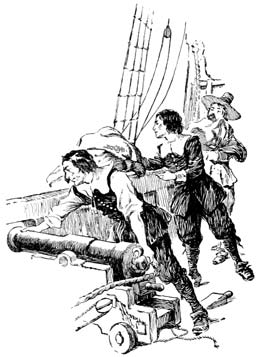
Standing clasped in each other's arms, unheeded by our elders, all of whom were in a painful state of anxiety or fear, we watched intently all that forenoon the ships which we believed belonged to the enemy.
Then I heard one of the sailors say that the Spaniards were surely gaining on us, and the captain of the vessel, as well as Master Winthrop and my father, must have believed it true, for all preparations were made for a battle. 14
The small cabins, leading from the great one, were torn down that cannon might be used without hindrance, and the bedding, and all things that were likely to take fire, were thrown overboard. The boats were launched into the sea and towed alongside the ship so that when the worst came we might fly in them, and then that which was most fearsome of all, the women and children were sent down into the very middle of the vessel, where they might not be in danger when the Spaniards began to send iron balls among us, as it seemed certain they soon would.
While we were huddled together in the darkness, many weeping, some moaning, and a few women, among whom was my mother, silent in the agony of grief, Master Winthrop came down to pray with us, greatly to our comforting, after which, so I have been told since, he went up among the men where he performed the same office.
It was not until an hour after noon that our people discovered that those ships which we believed to be Spanish, were English vessels, from which we had nothing to fear.
Then word was sent down to us in that dark place that we might come up above, and once in the sunlight again, we found all the passengers rejoicing and making merry over the fears which had so lately beset them.
How bright the sun looked to Susan and me as we 15 stood near the rail of our ship, gazing at the vessels which only a few hours before were a fearsome sight, but now seemed so friendly! It was as if we had been very near to death, and were suddenly come into a place of safety.
From that time until St. George's Day, which you all know is the twenty-third of April, nothing happened deserving of being set down here. Then it was, however, that during the forenoon the captain moved our sails so that the ship would remain idle upon the waters, which is what sailors call "heaving to," and the captains of the other vessels, together with Master Pynchon and many more gentlemen, came on board for a feast.
Lady Arabella and the gentlewomen of our company had dinner in the great cabin, while the gentlemen partook of their good cheer in the roundhouse, as the sailors call it, which is a sort of cabin on the hindermost part of the quarter-deck.
By four o'clock in the afternoon the feast was at an end; the gentlemen who had come to visit us went on board their own ships, and again were the vessels headed for that country of America in which we counted to spend the remainder of our lives.
Susan and I were much together during this voyage, 16 for neither of us made very friendly with the other children, and I do not remember that anything of import happened until we were come, so the captain said, near to the New World.
It is not needed I should set down that again and again were there furious storms, when it seemed certain our ship would be sunk, for there was so much of such disagreeable weather during the nine weeks of voyaging, that if I were to make a record of each unpleasant day, this diary would be filled with little else.
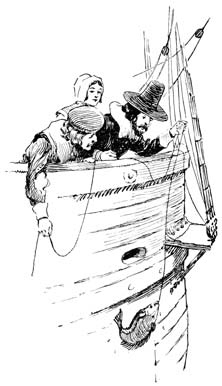
I have set down, however, that on the seventh day of June, which was Monday, we had come, so Master Winthrop said, off "the Banks," where was good fishing to be found; but why this particular spot on the ocean should be called the Banks, neither Susan nor I could understand. The waves were much like those we had seen from day to day; but yet, in some way, the captain knew that we had come to the place where it would be possible to take fish in great numbers, and so we did. 17
It is not seemly a young girl should set down the fact, with much of satisfaction, that she enjoyed unduly the food before her, and yet I must confess that those fish tasted most delicious after we had been feeding upon pickled pork, or pickled beef, with never anything fresh to take from one's mouth the flavor of salt.
It was a feast, as Susan and I looked at the matter, far exceeding that which we had on St. George's Day, and surely more enjoyable to us, for what can be better pleasing to the mouth than a slice of fresh codfish, fried until it is so brown as to be almost beautiful, after one has had nothing save that which is pickled?
Five days later, which is the same as if I said on the twelfth day of June, early in the morning, when Susan and I came on deck, we saw spread out before us the land, and it needed not we should ask if this was the America where we were to live, for all the people roundabout us were talking excitedly of the skill which had been displayed by the master of the Arabella, in thus bringing us directly to the place where we had counted on coming.
It can well be fancied that Susan and I overhung the rail as the ship sailed nearer and nearer to the land, watching intently everything before us; yet seeing, 18 much to our surprise, little more than would have been seen had we come upon the coast of England.
I had foolishly believed that even the shores of this New World would be unlike anything to be found elsewhere, and yet they were much the same. The rocks rising high above the waters, with the waves beating against them, made up a picture such as we had before us even while we lay at anchor off Cowes. The trees were like unto the trees in our own land, and the grass was of no different color. Save that all this before us was a wilderness, we might have been off the coast of Cornwall.
I have said it was all the same, and yet because of the fears and the anxieties regarding the future, was it different.
This was the land to which we had come for the making of a new home; the place where our parents had pledged themselves to spread the gospel as the Lord would have it spread.
We knew, because of what had been written by our friends who had journeyed to this new world before us that here we were to find brown savages, many of whom, like wild beasts, would thirst to shed our blood. Here also could we expect to see fierce animals, such as might not be met with elsewhere in the world; and, in the way of blessings, we should meet those friends of ours who, for conscience sake and for the will to do God's bidding, 19 had come to prepare the land that it should be more friendly toward us.
I had not yet been able to discover any of the dwellings which marked the town of Naumkeag, or Salem, when all the cannon on board our vessel were set off with a great noise. Then, as we came around a point of land, there appeared before our eyes a goodly ship lying at anchor, and beyond her the town that was—much to my disappointment, for I had fancied something grander—made up of a few log houses which seemed rather to be quarters for servants than dwellings for gentlemen's families, although we had been told that the habitations would be rude indeed.
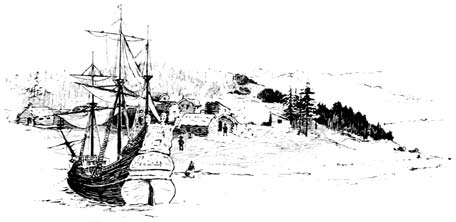
A boat was put into the water from our ship, and as the sailors rowed toward the vessel which was at anchor, I heard my father say to my mother that they were going in quest of Master William Pierce, a London friend of ours.
As we watched, I asked that question which had come often in my mind during the voyage, which was, why this new town that Master Endicott had built should have two names.
Mother told me that the Indians had called the place Naumkeag, and so also did those men who first settled here; but when some of our people came, and gathered around them several from the Plymouth Colony, together with a number of planters who had built themselves homes along the shore, it was decided to name the new town Salem, which means peace, for here it was they hoped to gain that peace which should be on this earth like unto the peace we read of in the Book, which passeth all understanding.
And now before I set down that which we saw, and while you are picturing our company on the deck of the Arabella looking shoreward, impatient to set their feet once more on the earth, let me tell you what I had heard, since we left England; regarding this town of peace, and those of our people, or of other faiths, who settled here two years or more ago. 21
Master Endicott, who was of our faith, had come to these shores in March of the year 1628, with a company of thirty or forty people, and, finding other men living at the head of this harbor which the Arabella had entered after her long voyage, decided to build his home at this place.
In the next year, Master Higginson, coming over with six vessels in which were eighteen women, twenty-six children, and three hundred men, joined the little colony. These last brought with them one hundred and forty head of cattle, and forty goats.
However, only two hundred of this last company remained at Salem, the others having chosen to build for themselves a new town, which they called Charlestown, on that large body of water which is set down on the maps as Massachusetts Bay.
In addition to these two villages, it was said that there were five or six houses at the place called Nantasket; that one Master Samuel Maverick was living on Noddles Island, and one Master William Blackstone on the Shawmut Peninsula.
I have set this down to the end that those who read it may understand we were not come into a wild country, in which lived none but savages, and I must also add 22 that not so many miles away was the town of Plymouth, where had been living, during ten years, a company of Englishmen who had worked bravely to make for themselves a home.
And now since I am done with explaining, and since the boat which put out from our vessel and which I left you watching, has come back from that other ship, bringing Master William Pierce, let me tell you what we did on the first day in this new world.
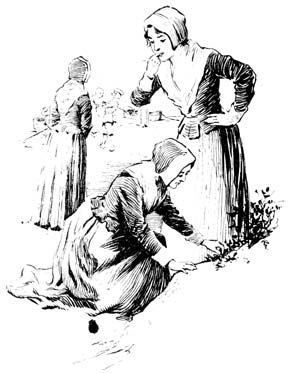
The gentlemen and ladies of our company were invited on shore to a feast of deer meat, while the servant women and maids were allowed to land on the other side of the harbor, where they feasted themselves on wild strawberries, which were exceeding large and sweet. 23
It would be untrue for me to say that deer meat made into a huge pie is not inviting, because of my having enjoyed it greatly, and yet I could not give so much attention to the dainty as I would have done at almost any other time, so intent was I upon seeing this village concerning which Master Endicott had written so many words of praise.
Had Susan and I come upon it within an hour after leaving the city of London, it would have looked exceedingly poor and mean; but now, when we were on the land after a voyage of nine long weeks, verily it seemed like a wondrous pleasant place in which to live.
More than an hundred dwellings, so my father said, had been built. Some were of logs laid one on top of the other in a clumsy fashion, with the places where windows of glass should have been, covered with oiled paper, and doors that were so cumbersome and heavy it was a real task for Susan and me to open and close them, but yet they had a homely look.
Then there were what might be called sheds, made of logs, or the bark of trees, and, in two cases, dwellings of branches laid up loosely as a child would build a toy camp.
It was as if each man had built according to his inclination and willingness to labor, the more thrifty having log dwellings, and the indolent ones rude huts.
Even Susan and I could understand that whosoever 24 had decided upon the places where these homes should be built, had in mind the making of a large town; for paths, like unto streets, led here and there, while all around grew trees, not thickly, to be sure, but yet in such abundance as to show that all this had lately been a wilderness.
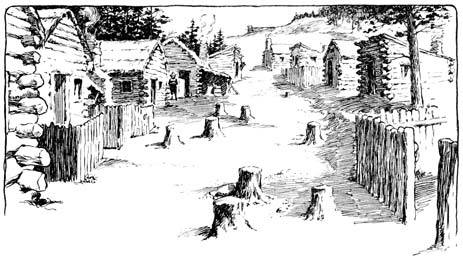
Even in these streets had been left the stumps of trees after the trunks were removed, which served to give an untidy look to the whole, making it seem as if one were in a place where had been built shelters only for a little time, and which would shortly be abandoned.
The welcome which was given us, however, was even warmer than we would have received at home in England, and little wonder that these gentlefolk whom we had known there, should be overjoyed to see us here.
Both Susan and I came to understand, not many 25 months afterward, how great can be the pleasure one has at seeing old friends whom he had feared never to meet again in this world.
It was a veritable feast which these good people of Salem set before us, and yet so strange was the cookery, that I am minded to describe later some of the dishes at risk of dwelling overly long upon matters of no importance.
Master Winthrop said, when we were going on board the ship again, that although it was nothing but peas, pudding, and fish, quite coarse as compared with what we would have had at home in England, save as to the venison pie, it all seemed sweet and wholesome to him.
When the day was come to an end, we went into the ship once more, for there were not spare beds enough in all the town to serve for half our party, and you may be very certain that once we were gathered again in the great cabin, all talked eagerly concerning what had been done; at least our parents did, for it would have been unseemly in us children to interrupt while our elders were talking.
Mother was not well satisfied with the houses, believing it would be possible to make dwellings more like those we left behind; but father bade her have 26 patience, saying that a shelter from the weather was the first matter to be thought of, and that the pleasing of the eye could well come later, after we had more with which to work.
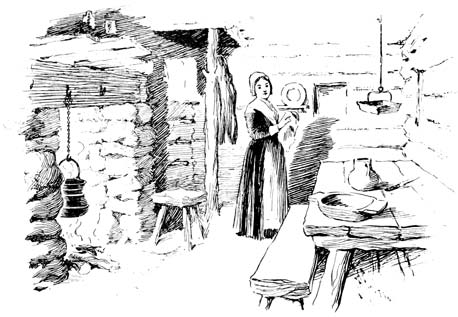
She, thinking as was I at the moment, of the floor in the house where we ate the venison pie, declared stoutly that there would be no more of labor in laying down planks, at least in the living-room, than in beating the earth hard, as it seemingly had been where we visited.
Then, laughingly, he bade her rest content, nor set her mind so strongly upon the vanities of this world, saying that if God permitted him to raise a roof, so that his wife and child might be sheltered from the sun 27 and from the rain, he would be satisfied, even though the legs of his table stood upon the bare earth.
It was this conversation between my parents that caused the other women to talk of how they would have a home built, until Lady Arabella put an end to what was almost wrangling,—for each insisted that her plan for a dwelling in this New World was the best,—by saying that whatsoever God willed we should have, and that it would be more than we deserved.
Both Susan and I had gazed about us eagerly when we went on shore, hoping to see a savage. We were not bent on meeting him near at hand, where he might do us a mischief; but had the desire that a brown man might go past at a distance, and we were grievously disappointed at coming aboard the ship again without having seen one.
Therefore it is that you can well fancy how surprised and delighted we were next morning when, on going on deck just after breakfast to have another look at this new town, whom should we see walking to and fro on the quarter-deck with Master Winthrop, as if he had been one of the first gentlemen of the land, but a real Indian!
There were the feathers, of which we had heard, 28 encircling his head and ending in a long train behind. His skin was brown, or, perhaps, more the color of dulled copper. He wore a mantle of fur, with the skin tanned soft as cloth, and that which father said was deer hide cunningly treated until it was like to flannel, had been fashioned into a garment which answered in the stead of a doublet.
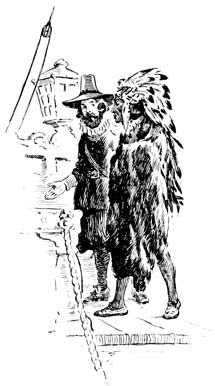
I cannot describe his appearance better than by saying it would not have surprised me, had I been told that one of our own people had painted and dressed himself in this fanciful fashion to take part in some revel, for truly, save in regard to the color of his skin, he was not unlike the gentlemen who were on the ship.
As Susan and I learned later, he was the king, or chief man, among those Indians who called themselves Agawams. Father said he was the sagamore, which, as I understand it, means that he was at the head of his people, and his name was Masconomo.
A very kindly savage was he, and in no wise bloodthirsty 29 looking as I had expected. He was a friend of Master Endicott as well as of all those who lived with him in this town of Salem, and had come to welcome our people to the new world, which, as it seemed to both Susan and me, was very thoughtful in one who was nothing less than a heathen.
The Indian sagamore stayed on board the ship all day, and our company, together with the people of Salem, were as careful to make him welcome as if he had been King James himself.
The reason for this, as father afterward explained to me, was because of its being of great importance that we make friends with the savages, else the time might come when they would set about taking our lives, being in far greater numbers than the white men.
Neither Susan nor I could believe that there was any danger that these people with brown skins would ever want to do us harm. Surely they must be pleased, we thought, at knowing we were willing to live among them, and, besides, if all the savages were as mild looking as this Masconomo, they would never be wicked enough to commit the awful crime of murder.
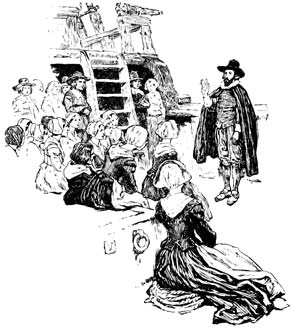
In the evening, after the Indian went ashore, the good people of Salem came on board in great numbers, and, seeing that it was a time when he might do good to their souls, Master Winthrop gathered 30 us on deck, where he talked in a godly strain not less than an hour and a half.
It was indeed wicked of Susan to say that she would have been better pleased had we been allowed to chat with the people concerning this new land, rather than listen to Master Winthrop, who, so mother says, is a most gifted preacher even though that is not his calling, yet way down in the bottom of my heart I felt much as did Susan, although, fortunately, I was not tempted to give words to the thought.
When another day came, we girls had a most delightful time, for there was to be a baby baptized in the house of logs where are held the meetings, and Mistress White, one of the gentlefolks who came here with the company of Master Higginson, was to give a dinner because of her young son's having lived to be christened. 31
To both these festivals Susan and I were bidden, and it surprised me not a little to see so much of gaiety in this New World, where I had supposed every one went around in fear and trembling lest the savages should come to take their lives.
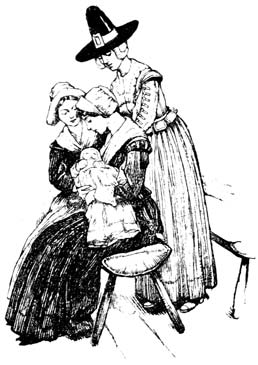
The christening was attended to first, as a matter of course, and, because of his having so lately arrived from England, Master Winthrop was called upon to speak to the people, which he did at great length. Although the baby, in stiff dress and mittens of linen, with his cap of cotton wadded thickly with wool, must have been very uncomfortable on account of the heat, he made but little outcry during all this ceremony, or even when Master Higginson prayed a very long time.
We were not above two hours in the meetinghouse, and then went to the home of Mistress White, getting there just as she came down from the loft with her young son in her arms. 32
Mother was quite shocked because of the baby's having nothing in his hands, and while she is not given to placing undue weight in beliefs which savor of heathenism, declares that she never knew any good to come of taking a child up or down in the house without having first placed silver or gold between his fingers.
Of course it is not so venturesome to bring a child down stairs empty-handed; but to take him back for the first time without something of value in his little fist, is the same as saying that he will never rise in the world to the gathering of wealth.
The dinner was much enjoyed by both Susan and me, even though the baby, who seemed to be frightened because of seeing so many strange faces, cried a goodly part of the time.
We had wild turkey roasted, and it was as pleasing a morsel as ever I put in my mouth. Then there was a huge pie of deer meat, with baked and fried fish in abundance, and lobsters so large that there was not a trencher bowl on the board big enough to hold a whole one. We had whitpot, yokhegg, suquatash, and many other Indian dishes, the making of which shall be explained as soon as I have learned the methods.
It was a most enjoyable feast, and the good people of Salem were so friendly that when we went on board ship that night, Susan and I were emboldened to say 33 to my father, that we should be rejoiced when the time arrived for our company to build houses.
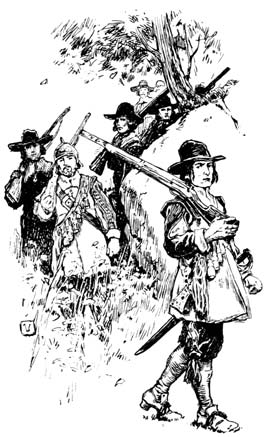
Then we learned for the first time that it had not been the plan of our people to settle in this pleasant place. It was not to the mind of Governor Winthrop, nor yet in accord with the belief of our people in England, that all of us who were to form what would be known as the Massachusetts Bay Colony, should build our homes in one spot.
Therefore it was that our people, meaning the elders among the men, set off through the forest to search for a spot where should be made a new town, and we children were allowed to roam around the village of Salem at will, many of us, among whom were 34 Susan and I, often spending the night in the houses of those people who were so well off in this world's goods as to have more than one bed.
Lady Arabella Johnson and her husband had gone on shore to live the second day after we arrived, for my lady was far from well when she left England, and the voyage across the ocean had not been of benefit to her.
Our fathers were not absent above three days in the search for a place to make our homes, and then Sarah and I were told that it had been decided we should live at Charlestown, where, as I have already told you, a year before our coming, Master Endicott had sent a company of fifty to build houses.
It pleased me to know that we were not going directly into the wilderness, as both Susan and I had feared; but that we should be able to find shelter with the people who had already settled there, until our own houses could be built.
It appeared that all the men of our company were not of Governor Winthrop's opinion, regarding the place for a home. Some of them, discontented with the town of Charles, went further afoot, deciding to settle on the banks of a river called the Mystic, while yet others crossed over that point of land opposite where we were to live, and found a pleasing place which they had already named Rocksbury. 35
Susan and I believed, on the night our fathers came back from their journey, that we would set off in the ship to this village of Charlestown without delay, and so we might have done but for my Lady Arabella, who was taken suddenly worse of her sickness; therefore it was decided to wait until she had gained her health.
But alas! the poor lady had come to this New World only to die, and it was a sad time indeed for Susan and me when the word was brought aboard ship that she had gone out from among us forever.
We had learned during the voyage to love her very dearly, and it seemed even more of a blow for God to take her from us in this wilderness, than if she had been at her home in England.
Although it is not right for me to say so, because, of course, our fathers know best, yet would my heart have been less sore if some word of farewell could have been said when we laid my Lady Arabella in the grave amid the thicket of fir trees.
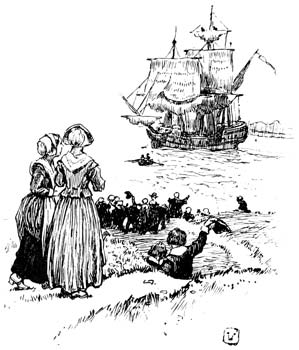
Mother says, that she is but repeating the words of Governor Winthrop, that it is wrong to say prayers over the dead, or to utter words of grief or faith. Therefore it was in silence we followed my lady in the coffin made by the ship's carpenter, up the gentle slope to 36 the thicket of firs, the bell of the Arabella tolling all the while; and in silence we stood, while the body was being covered with earth, little thinking how soon should we be doing a like service for another who had come to aid in building up a new nation.
On the day after we left my Lady Arabella on the hillside, the ship Talbot, which was one of the vessels that should have sailed in company with the Arabella, arrived at Salem, and the grief which filled our hearts for the dead, was lightened somewhat by the joy in greeting the living who were come to join us.
Governor Winthrop was among those who seemingly had most cause for rejoicing, because of his son Henry's having arrived on the Talbot, bringing news of his mother and of the remainder of the family.
Good Master Winthrop had so much of business to 37 look after on this day, that he could not spend many moments in talking with his son, and mayhap he will never cease to regret that he did not give his first attention to the boy, for, during the afternoon, while his father was engaged with public affairs, Henry was moved by curiosity to visit some Indian wigwams which could be seen a long distance along the coast.
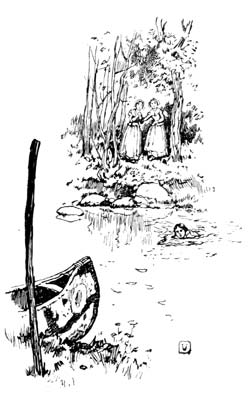
Not being of the mind to walk so far, he cast about for a boat of some kind, and, seeing a canoe across the creek, plunged into the water to swim over that he might get it.
Susan and I were watching the brave young man when he sprang so boldly and confidently into the water, never dreaming that harm might come to him, and yet before he was one quarter way across the creek, he suddenly flung up his arms with a stifled cry. Then he sank from our sight, to be seen no more alive.
He had been seized with a cramp, while swimming most-like 38 because of having gone into the cold water heated, so my father said, for the day was very warm; but however that may be, eight and forty hours later we walked, a mournful procession, up the hill, even as we had done behind the earthly clay of Lady Arabella, while the bells of the ships in the harbor tolled most dismally.
Verily Governor Winthrop's strength is in the Lord, as my mother said, for although his heart must have been near to bursting with grief, no one saw a sign of sorrow on his face, so set and stern, as he stood there listening to the clods of earth that were thrown upon the box in which lay the body of his son.
Susan, who is overly given to superstition, I am afraid, declared that it was an ill omen for us to have two die when we had but just come into the new country, and when I told her that it was wicked to place one's faith in signs, she reminded me that I found fault because of Mistress White's baby's being taken out of the room for the first time with neither gold nor silver in his hands.
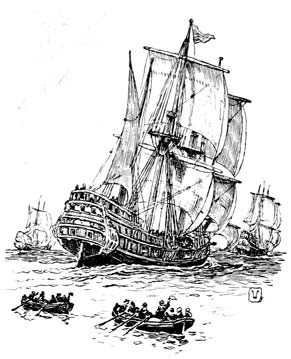
The ship Success, which was also of our fleet, having been left behind when we sailed from England, came into the harbor on the sixth of July, and then it was, 39 although our hearts were bowed down with grief because of the death of Lady Arabella and the drowning of Henry Winthrop, that our people decided we should hold a service of thanksgiving to God because of His having permitted all our company to arrive in safety.
Word was sent to the people of Charlestown, and to those few men in the settlement which is called Dorchester, that they might join with us in the service of praise, and many came to Salem to hear the preaching of Master Endicott, Master Higginson, and Governor Winthrop.
Four days later, which is the same as if I said on the twelfth of July, the fleet of ships sailed out of Salem harbor with those of our people on board who could not bear the fatigue of walking, to go up to the new village of Charlestown.
Before night was come, we were at anchor off that 40 place where we believed the remainder of our days on this earth would be spent.
Because of the labor performed by those men whom Master Endicott had sent to this place a year before, there were five or six log houses which could be used by some of our people, and the governor's dwelling, which of course would be the most lofty in the town, was partially set up; yet the greater number of us did not go on shore immediately to live.
Governor Winthrop remained on board the Arabella, as did my parents and Susan's, and now because there is little of interest to set down regarding the building of the village, am I minded to tell that which I heard our fathers talking about evening after evening, as we sat in the great cabin when the day's work was done.
To you who have never gone into the wilderness to make a home, the anxiety which people in our condition felt concerning their neighbors cannot be understood. To us, if all we heard regarding what the savages might do against us was true, it was of the greatest importance we should know who were settled near at hand, if it so came that we were driven out from our town.
Now you must know that many years before, which is much the same as if I had said in the year of our Lord, 41 1620, a number of English people who had been living in Holland because of their consciences not permitting them to worship God in a manner according to the Church of England, came over to this country, and built a town which was called Plymouth.
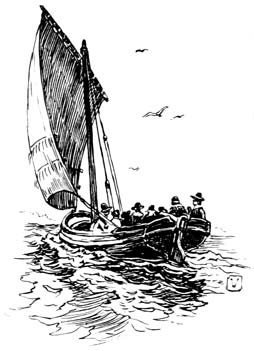
This town was not far by water from our settlement; indeed, one might have sailed there in a shallop, if he were so minded, and, in case the wind served well, perform the voyage between daylight and sunset.
It was, as I have said, settled ten years before we came to this new world, and the inhabitants now numbered about three hundred. There were sixty-eight dwelling houses, a fort well built with wood, earth and stone, and a fair watch tower. Entirely around the town was a stout palisade, by which I mean a fence made of logs that stand eight or ten feet above the surface, and placed so closely together that an enemy may not make his way between them, and in all respects was it a goodly village, so my father declared. 42
Near the mouth of the Neponset river Sir Christopher Gardner, who was not one of our friends in a religious way, had settled with a small company, and farther down the coast, many miles away, it was said were three other villages; but none among them could outshine Salem, either in numbers of people, or in dwellings.
When we were on the shore in Charlestown, looking straight out over the water toward the nearest land, we could see, not above two miles away, three hills which were standing close to each other, and Master Thomas Graves, who had taken charge of the people that first settled in the town of Charles, had named the place Trimountain; but the Indians called it Shawmut. There only one white man was living and his name was Master William Blackstone, as I have already told you.
It seemed to me a fairer land, because of the hills and dales, than was our settlement, and yet it would not have been seemly for me to say so much, after our fathers and mothers had decided this was the place where we were to live.
The days which followed our coming to Charlestown were busy ones, even to us women folks, for there 43 was much to be done in taking the belongings ashore, or in helping our neighbors to set to rights their new dwellings.
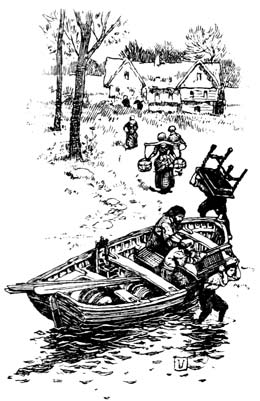
The Great House, in which Governor Winthrop would live, was finished first, and into this were moved as many of our people as it would hold.
Then again, there were others who, not content with staying on the Arabella after having remained on board of her so long, put up huts like unto the wigwams made by the Indians, which, while the weather continued to be so warm, served fairly well as places in which to live.
If I said that we made shift to get lodgings on shore in whatsoever manner came most convenient for the moment, I should only be stating the truth, for some indeed were lodged in an exceeding odd and interesting fashion.
Susan's father, going back some little distance from 44 the Great House, cut away the trees in such a manner as to leave four standing in the form of a square, and from one to another of these he nailed small logs, topped with a piece of sail cloth that had been brought on shore from the Talbot, finishing the sides with branches of trees, sticks, and even two of his wife's best bed quilts. Into this queer home Susan went with her mother, while my parents were content to use one of the rooms in the Great House until father could build for us a dwelling of logs.
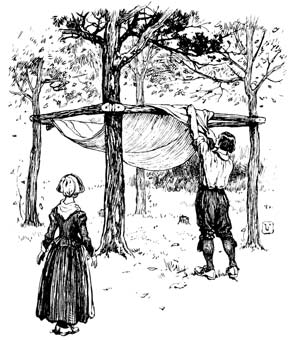
It seemed much as if Susan was in the right, when she said that the deaths of Lady Arabella and Henry Winthrop were ill omens, because no sooner had all our people landed from the ships, or come up through the forest from Salem, than a great sickness raged among us.
Many had been ill during the voyage with what 45 Master Higginson called scurvy, which is a disease that attacks people who have lived long on salted food, and again many others took to their beds with a sickness caused by the lack of pure, fresh water.
Our fathers had but just begun to build up this new town when it was as if the hand of God had been laid heavily upon us, for, so it was said, not more than one out of every five of our people was able to perform any work whatsoever.
Those were long, dismal, dreadful days, when at each time of rising in the morning we learned that this friend or that neighbor had gone out from among us, and it seemed to Susan and me as if there were a constant succession of funerals, with not even the tolling of bells to mark the passage of a body from its poor home to its last resting place on earth, for by this time the ships had gone out of the harbor.
The graves on the side of the hill increased tenfold faster than did the dwellings, and all of us, even the children, felt that our only recourse now was to pray God that He would remove the curse, for of a verity did it seem as if one had been placed upon us.
Again and again did I hear men and women who had ever been devout and regular in their attendance upon the preaching, ask if we had not offended the Lord by breaking off from the English church, or if we might not have committed some sin in thus abandoning the land 46 of our birth, thinking to ourselves that we would build up a new nation in the world.
Therefore it was that even Susan and I felt a certain relief of mind, when Governor Winthrop set the thirtieth day of July as a day of fasting and of prayer; and in order that all the English people who had come into this portion of the New World might unite with us in begging God to remove the calamity from our midst, word was sent even as far as Plymouth, asking that every one meet on that day with words of devout petition.
I have no doubt, because of mother's having said so again and again, that the good Lord heard our fervent entreaties, although the sickness was not removed from among us for near to six weeks.
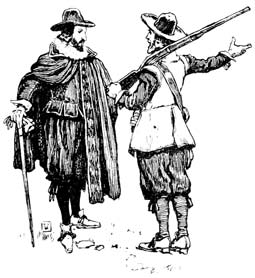
Then it was that Master William Blackstone came across from Trimountain, and told Governor Winthrop it was his belief we should do more toward aiding 47 ourselves than simply praying. He advised, because of there being plenty of good water in Trimountain, that we forsake this village of Charlestown, and go across to the opposite shore.
I might set down many words, repeating what I heard our fathers say concerning the wisdom of such a move, and yet this story which I am telling would not be improved thereby, for the day finally came when it was decided that, even at the cost of building new dwellings, we should take all our belongings across the water to the cove, back of which was a small hill, and, yet further behind, a circle of mountains.
The cove would make an agreeable harbor for our boats; the hill straight behind it would serve as a location for a fort, while here and there were pleasant streams, or gushing springs, whereas in Charlestown we had only the water of the river, or from the marsh.
That I may not weary you by much explaining, it is best I say that on the seventeenth of September, when the sun had risen, we gathered at the Great House to pray that God would bless us in this which was much the same as our second undertaking, for without delay, and before night had come, we were to go across the bay and make for ourselves other homes.
And now lest it seem as if I were telling the same story twice, I will not set down anything concerning the building of this second village, because of that which 48 we did in Trimountain being the same as had been done in Charlestown.
The Great House was taken apart and carried across the water, as were also the dwellings of logs, and while this was being done, the women and children stayed in Charlestown, where Master Thomas Graves had made, what seemed to Susan and me, odd rules and regulations.
He had been placed in command of the settlement by Master Endicott, and among his first acts was the appointment of tithing men, one of whose duties it was to prevent the boys from swimming in the water, as some lads of our company speedily learned when they would have enjoyed such sport.
They were arrested straightway, and but for the fact of being strangers, who were not acquainted with the rules of the settlement, would have been fined three shillings each.
Susan and I had no desire to spend our time swimming, even had it been seemly for girls so to do; but during very warm days it would have pleased us much to go down into the water, properly clad, in order to take a bath. Therefore did we believe Master Graves had done that which was almost cruel, and it surprised us 49 no little when, later, our own fathers passed the same law.
There were good friends of ours in England who believed that we had come into a wilderness where was to be found naught save savages and furious beasts, and it would have surprised them greatly, I believe, if they could have known how much of entertainment could already be found.
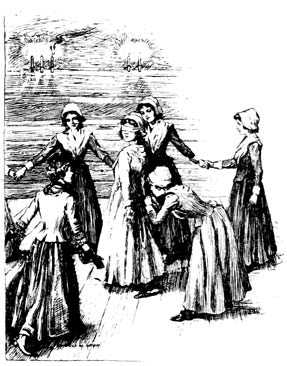
It was while we were waiting in Charlestown for the homes in Trimountain to be built, that Anna Foster, whose father is one of the tithing-men, invited all of us young girls who had come under Governor Winthrop's charge, to spend an evening with her, and we had much pleasure in playing hunt the whistle and thread the needle.
Anna was dressed in a yellow coat with black bib and apron, and she had black feathers on her head. 50 She wore both garnet and jet beads, with a locket, and no less than four rings. There was a black collar around her neck, black mitts on her hands, and a striped tucker and ruffles. Her shoes were of silk, and one would have said that she was dressed for some evening entertainment in London.
Neither Susan nor I wore our best, because of the candles here being made from a kind of tallow stewed out of bayberry plums, which give forth much smoke, and mother was afraid this would soil our clothing. We were also told that because of there not being candles enough, some parts of the house would be lighted with candle-wood, which last is taken from the pitch pine tree, and fastened to the walls with nails. This wood gives forth a fairly good light; but there drops from it so much of a black, greasy substance, that whosoever by accident should stand beneath these flames would be in danger of receiving a most disagreeable shower.
This entertainment was not the only one which was made for our pleasure while we remained in Charlestown; but because of the sickness everywhere around, very little in the way of merrymaking was indulged in, and it seemed almost a sin for us to be thus light-hearted while so many were in sore distress. 51
The first thing which was done by the governor and his advisors, after we had moved from Charlestown, was to change the name of Trimountain to that of Boston.
As you must remember, Boston in England was near to the home of Captain John Smith, who explored so much of this New World and planted in Jamestown a prosperous settlement. It was also in Boston that the Lady Arabella, and the preacher, John Cotton, who had promised to come here to us, had lived; therefore did it seem as if such were the proper name for a town which we hoped would one day, God willing, grow to be a city.
It is true our new village is built in a rocky place, where are many hollows and swamps, and it is almost an island, because the neck of land which leads from it to the main shore, is so narrow that very often does the tide wash completely over it; but yet, after that time of suffering in Charlestown, it seems to us a goodly spot.
Our dwellings, except the Great House, are made of logs, and the roofs thatched with dried marsh-grass, or with the bark of trees. That each man shall have so much of this thatching as he may need, the governor and 52 chief men of the village have set aside a certain portion of the salt marsh nearby, where any one may go to reap that which is needed for his own dwelling; but no more.
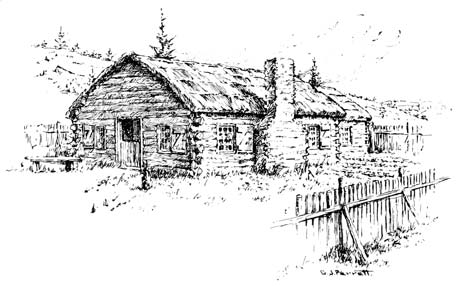
In time to come, so father says, we shall have chimneys built of brick or stone, for when our settlement is older grown some of the people will, in order to gain a livelihood, set about making bricks, and already has Governor Winthrop sent out men to search for limestone so we may get mortar. But until that time shall come, we have on the outside of our houses what are called chimneys, which are made of logs plastered with clay, or of woven reeds besmeared both as to the outside and the inside with mud, until they are five or six inches thick. 53
It needs not for me to say that these chimneys are most unsafe, for during our first winter in this new town of Boston, hardly a week passed but that one or another caught fire; and among the first laws which our people passed was one providing for the appointment of firewardens, who should have the right, and be obliged, to visit every kitchen, looking up into the chimneys to see if peradventure the plastering of clay had been burned away.
Because of the number of these fires, and the likelihood that they would continue to visit us frequently, another law was made, obliging every man who owned a dwelling of logs to keep a ladder standing nearby, so that it might be easy to get at the thatched roof if the flames fastened upon it; and, as soon as might be, iron hooks with large handles were made to be hung on the outside of the buildings, for the purpose of tearing off the thatch when it was burning.
It has also been decided that when we have a church, as we count on within a year, a goodly supply of ladders and buckets shall be kept therein for the use of the entire town, and then, when a fire springs out, our people will know where to go for tools with which to fight against it. 54
It must not be supposed that because of our dwellings being unsightly on the outside, they are rough within, for such is not the case. Many of the settlers, as did father, brought over glass for the windows, therefore we are not forced to put up with oiled paper, as are a great many people living in this New World.
It was partly the dampness inside our homes, so Governor Winthrop believed, which caused the sickness in Charlestown, and therefore it was that my father insisted we should have a floor of wood, instead of striving to get along with bare ground which had been beaten hard. Our floor is made of planks, roughly hewn, it is true, but nevertheless it serves to keep our feet from the ground. We have on the door real iron hinges, instead of leather, or the skins of animals, as we saw in Salem.
Save for the roughness of the floor and the walls, the inside of my father's house is much the same as we had in England, for he, like all of Governor Winthrop's company who were able to do so, brought over the furnishings of the old home, and while some of the things look sadly out of place here, they provide us with a certain comfort which would have passed unheeded in the other country, because there we were not 55 much better off in this world's goods than were our neighbors.
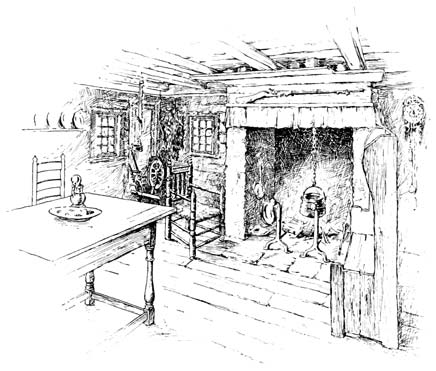
Here, when I see a table made only of rough boards spread upon trestles, I can get much pleasure out of the knowledge that we brought with us those tables which we had been using in England, and, when our dinner is spread, save for the difference in the food, I can well fancy myself in the old home. We have our ware of pewter and of copper, and our trencher bowls are of the best that can be hewn from maple knots.
In order that the walls and crevices, filled with moss and plastered over with clay, may not offend the eye, 56 mother has put up all the hangings which she brought with her, and these, with some skins my father bought at Salem, hide entirely that which is so unsightly in other dwellings.
Contrasting our home with many which we saw in Salem, or in Charlestown, I am come to believe my lines are truly cast in pleasant places, and I strive to be thankful to God for having given me the father which I have.
I am afraid it may be almost sinful for me so to set my mind upon the garments which one wears, and yet I cannot but contrast my father with some of the common men in the village.
The ruff which he wears around his neck is always well starched, clean, and stands out in beautiful proportions. On his low, peaked shoes, mother ever has fixed rosettes, or knots made of ribbon. His doublet, which is gathered around the waist with a silken belt, is slashed on the sleeves to show the snowy linen beneath. His trunk hose, meaning those which reach from his waist to his knees, are of the finest wool. His stockings, when he is dressed to meet with the Council, are of silk, while his mandilion, or cloak, is always of silk or velvet. 57
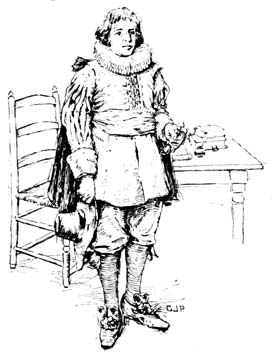
Perhaps one may think such attire hardly befitting a wild place like this, yet I know of nothing which serves to set off a man's figure, making him seem of importance in the world, better than that he be clad with due regard to the fashion of the day. Master Winthrop would not present the gentlemanly appearance which he does if he wore, as do the common people here, a band, or a flat collar with cord and tassels, breeches of leather, and a leather girdle around his waist. If he had, as do they, heavy shoes with heels of wood, or if his clothing were fastened together with hooks and eyes, instead of silken points, and if his hat were of leather, would we be pleased to call him Governor?
My mother often says that it is unseemly in a child like me to speak of the clothing worn by gentlemen, and yet I have noticed often and again, that she is as careful of my father's attire when he goes out of doors as she was at home in England, where all gentlemen were dressed becomingly. 58
Verily one need not go abroad in tatters, or oddities, simply because of having come into this New World, where much of work is required, and he who cares for his personal appearance, to my way of thinking, is to be given due credit.
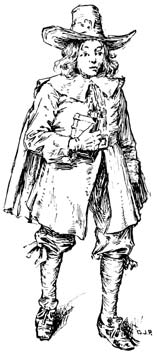
Surely so the Massachusetts Bay Company thought, for they furnished to every man who came from England to settle here, save it be those who could afford such things for themselves, four pairs of shoes and the same number of stockings; four shirts; two suits of doublet, and hose of leather lined with oiled skin; a woolen suit, lined with leather, together with four bands and two handkerchiefs, a green cotton waistcoat, two pairs of gloves, a leather belt, a woolen cap and two red knit caps, a mandilion lined with cotton, and also an extra pair of breeches. Of course such an outfit was for the common people, not the gentlefolk.
In our company, the boys are clothed exactly as are their fathers, and many of them present a most attractive appearance, although my mother would not think it proper for me to say so, much less to put it down in writing. 59
It surely cannot be wrong for me to think of that which I wear, for if the good Lord has given me a comely body, why shall I not array it properly? Or if it be wrong, why did my father buy for me those things, a list of which I am here setting down, not from vanity, but simply to show how kind were my parents?
I had a cap ruffle and a tucker, the lace of which cost five shillings a yard; eight pairs of white kid gloves, with two pairs of colored gloves, two pairs of worsted hose and three pairs of thread, a pair of laced silk shoes, and a pair of morocco shoes, not to speak of four pairs of plain Spanish shoes, or two pairs made of calf-skin for every day use; a hoop coat and a mask to wear when the wind blows too roughly, and a fan for use when the sun is hot. Susan had two necklaces, one of garnet and one of jet; but I had only garnets. Then I have a girdle with a buckle of silver; a mantle and coat of lutestring; a piece of calico to be made up when mother has time; four yards of ribbon for knots or bows, and one and one-half yards of best cambric. All these were bought especially for me when we left home, and surely it can be no sin that I take pride in them. 60
It was shortly after coming to this town of Boston that we heard of the death of Master Johnson, Lady Arabella's husband. A friendly man was he, ever ready with a kindly word for us children, and we would have mourned his loss much more, but for knowing that it pleased him right well to go out of this world of sorrow, that he might join his wife in God's country.
Susan and I had hoped we should hear of no more deaths among those we cared for, after having come into this last place of abode, and the news of Master Johnson's taking away caused her superstitious fears to break out anew; but I reminded her that we were in God's keeping, whatsoever might befall, and that for us to look forward into the morrow, searching for evil, was the same as an injustice to our Maker, who would do toward us whatsoever seemed good in His sight.
As I look back now upon the time when our town of Boston first came into being, I can understand how well it is for us that we may not read the future. Had we at that time, when the winter was coming on, known how much of sorrow and of suffering was in store for us, before the earth would be freed from its bonds of ice, then I believe of a verity we must have given up in despair. 61
However, it is not for me to look ahead even in this poor attempt at setting down what we did in the new land. Rather let me go back to our home life, and tell somewhat concerning the odd dishes which were frequently set on our table.
There is little need for me to say that we had lobsters in abundance, and of such enormous size that one was put to it to lift them. I have heard it said that twenty-pound weight was not unusual, and whosoever might could catch, in traps made for the purpose, all the lobsters he would.
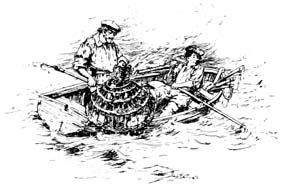
As for other fish, I can not set down on one page of this paper, the many kinds with which the housewife might provide herself for a trifling sum of money. We often had eels roasted, fried, or boiled, because of father's being very fond of them, and mother sometimes stuffed them with nutmegs and cloves, making a dish which was not to my liking, for it was hot to the tongue. 62
Some of the good wives in Salem had shown my mother how to prepare nassaump, which those who first came to Salem learned from the Indians how to make: It is nothing but corn beaten into small pieces, and boiled until soft, after which it is eaten hot, or cold, with milk or butter.
Nookick is to my mind more of a dainty than a substantial food, and yet father declares that on a very small quantity of it, say three great spoonfuls a day, a man may travel or work without loss of strength. It is made by parching the Indian corn in hot ashes, and then beating it to a powder. Save for the flavor lent to it by the roasting, I can see no difference between nookick, and the meal made from the ground corn.
Mother makes whitpot of oat meal, milk, sugar and spice, which is much to my taste, although father declares it is not unlike oatmeal porridge such as is eaten in some parts of England; but it hardly seems to me possible, because of one's not putting sugar and spice into porridge.
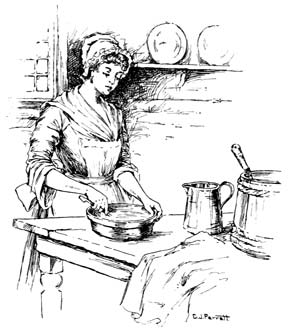
We often have bread made of pumpkins boiled soft, and mixed with the meal from Indian corn, and this father much prefers to the bread of rye with the meal of corn; but the manner of cooking pumpkins most to my liking, is to cut them into small pieces, when they are ripe, and stew during one whole day upon a gentle fire, adding fresh bits of pumpkin as the mass softens. If 63 this be steamed enough, it will look much like unto baked apples, and, dressed with a little vinegar and ginger, is to me a most tempting rarity. But we do not often have it upon the table because of so much labor being needed to prepare it.
Yokhegg is a pudding of which I am exceedingly fond, and yet it is made of meal from the same Indian corn that supplies the people hereabout with so much of their food. It is boiled in milk and chocolate, sweetened to suit one's taste after being put on the table, and while to English people, who are not accustomed to all the uses which we make of this wheat, it may not sound especially inviting, it most truly is a toothsome dainty.
The cost of setting one's table here is not great as compared with that in England, for we may get a quart of milk by paying a penny, or a dozen fat pigeons, in the season, for three pence, while father has more than once bought wild turkeys, to the weight of thirty pounds, 64 for two shillings, and wild geese are worth but eight pence.
The season had come when, if we had been in England, the people would have been gathering the harvest; but here we had none, having come so late in the year that there was no time to plant, and, consequently, we had no crops.
I had never before realized how necessary it is for people that the earth shall yield in abundance; but I came to know it now right well through hearing father, as he talked with mother regarding the fears which the chief men of the colony had concerning the supply of food.
Of course, girls such as Susan and I would not have been likely to learn anything of the kind, save that matters had come to such a pass as made the situation serious, in which case it was no more than natural we should hear our parents talking about it.
It seems, from what I learned, that a portion of the provisions brought from England were spoiled during the voyage, and also, that many of our people had taken with them no more than enough to sustain life for a month or two, believing that in this New World food of all kinds would be found in abundance. 65
Then again, many had bartered provisions, which they should have kept for the winter use, with the Indians in exchange for beaver skins, thinking thereby to make much money. So general had this traffic become, that early in September the Governor gave strict orders against it, and it was also ordered that no person in the town be allowed to carry out therefrom anything eatable.
But yet the store of food grew smaller and smaller, for there were many mouths to feed, and it seemed as if we children were more often hungry because of knowing that there was little to be had.
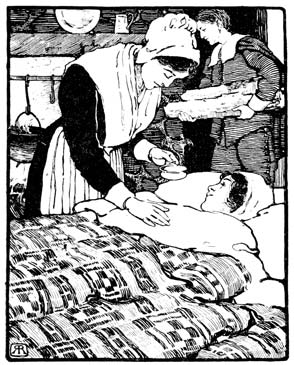
Susan reminded me of what she was pleased to call the "omen," when it was as if the first of our duties in the New World had been to bury two members of the company, and as the days wore on I began really to believe it a sin to harbor such thoughts.
As it had been in Charlestown, so did it come to be here in Boston, when the rains of autumn set in.
Many of the dwellings had not been built with due regard to sheltering those who were to live therein, and because of the dampness—although mother says it was owing quite as well to the homesickness and gloom which came upon us when the leaves in the forest turned brown, and yellow, and golden in token of the dying year—the people sickened.
However it was, much of sickness prevailed among 66 us in Boston, until the time came when my father and mother, to both of whom God had allowed good health, were absent from home day after day, nursing those of our neighbors who were unable to aid themselves.
It seemed at this time as if the Lord had set His face against the rearing of a nation in this new land, which he had given to the brown men for their homes, and Susan and I were not the only ones who came to believe we were offending Him in some way by thus having come here.
Then Governor Winthrop caused it to be known throughout the town that he had hired Captain Pierce, of the ship Lyon, which was then in Salem Harbor, to go with all haste to the nearest town in England, there to get for us as much of food as could be bought. 67
This news cheered the people somewhat, for now was the season when the winds blew strong, and it was believed the ship would have speedy passage. Indeed, some of the women declared she must return before the middle of October, and said so much concerning such possibility, that in time they came to believe it true. Therefore, when the month of October had nearly passed, their disappointment was great, and they were more despondent than at first.
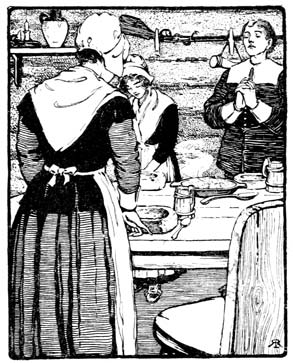
Each day saw the store of provisions in the town grow smaller. Every family husbanded that which could be eaten, with greatest care, putting no more on the table than was absolutely necessary for a single meal, and those things which we had considered dainties, were no longer prepared. 68
Then came the Angel of Death, and man after man, woman after woman, laid themselves down to die, not from being starved, but, so Governor Winthrop declared, from having sickened through scurvy, which had come upon them during the voyage, after which, falling into discontent and giving way to home-sickness, they no longer struggled to live.
Before October had come to an end, food was so scarce in Boston that the poorer people had nothing save acorns, clams, and mussels to eat. During the summer it had seemed as if the sea were actually filled with fish, and yet now, when every boat that could be found in the town and nearby had been sent out, it was difficult for our men to take even fifty pounds weight in a day.
As Susan said, even the fish forsook us, as the clams and mussels would have done had they legs or fins.
The fowls of the forest also appeared to have departed, and by November the most any family could boast of was meal boiled in salt and water. In more happy days I would have turned up my nose at such food, and yet now it was like unto some sweet morsel, for so scanty had our store become that my mother would cook for each meal no more than half as much as we could have eaten.
I have heard father say that for a bushel of flour which had been brought from England, he paid in 69 those dark days fourteen shillings, and there was so little of it even at such price, that mother saved what store we had that it might be made into gruel, or something dainty, which the sick could keep upon their stomachs.
Then it was that our pinnace was made ready for a voyage, and with five of the strongest men on board, was sent along the coast to trade with those Indians who called themselves Narragansetts, taking with them everything in the way of trinkets which was in the general store, or could be gathered up from among the housewives.
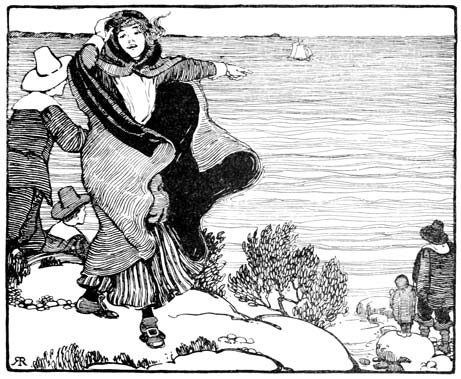
Great was our rejoicing, five days later, when the men came back, bringing with them an hundred bushels of Indian corn. This seemed like a large amount of food, and yet, so many were the mouths to be fed from it, it was, so father said, scarce enough to hold life in our bodies three days, if so be it had been divided equally among all.
Father told us that three men, who were of the poorer people, had walked all the way from Boston town to Plymouth; but even there, where a harvest had been gathered, they could get no more than one half-bushel of meal made from Indian corn.
It was a time of famine such as I pray God we may never know again. In my home, until these dreary days, there had been no scarcity of food, and yet again and again did I save a crust of rye bread, thinking it a dainty to be nibbled upon slowly so that I might have longer the pleasure of eating.
It was as if the ship Lyon, on whose return a few weeks before we had counted so hopefully, was gone, never to come back.
Even the children watched the direction of the winds, saying on this day that it was a favoring one if the Lyon were on her course for Boston, and on 71 the morrow mourning because of the breeze being against her.
Yet she came not, nor did we hear aught concerning her, or any other from the world beyond us.
We were alone in what was much the same as a wilderness, and all those around upon whom we had counted to aid us in time of distress were in nearly the same dismal straits as were we.
Even the Indians declared that they were hard pressed for something to eat, and more than once did they come in twos or in threes to beg from us who were starving, something that could be eaten.
Susan and I, as we sat clasped in each other's arms hungry, and pining for the home over-seas which we had left, came to fancy that the famine which held possession of the land was like unto some terrible monster who hung above us as a cloud, settling slowly but surely day after day, until the hour would come when his terrible fangs would be securely fastened upon us.
During the month of January the deaths through scurvy, if that indeed were the cause, grew less; but all believed that in the stead of being removed by disease, our people were slowly perishing from starvation.
All the food in Boston was brought together, and portioned out, so that no one, whether he had of money, 72 or was penniless, should suffer more than another. And yet again and again in the night have I been awakened by the gnawing of hunger in my stomach.
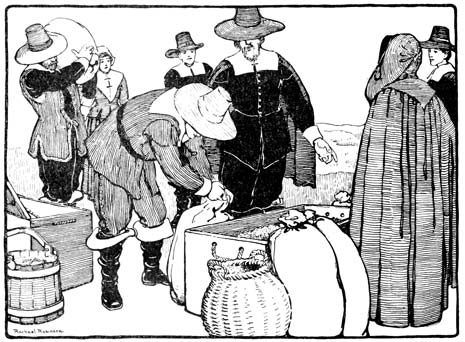
With the beginning of January, Governor Winthrop appointed a day on which we should all fast and pray, as if indeed we had been doing other than fasting throughout the long, dreary winter. On this day every man, woman, and child in Boston town was to spend his or her time in praying to the Lord to deliver us from our affliction.
We no longer hoped for the coming of the Lyon. Surely she must have been destroyed by the tempest, 73 otherwise had we seen her before this, for nearly five months had gone by since she left Salem Harbor.
It was on the fifth day of February, which is the same as if I had said Saturday, and the fast was to be kept on the next Thursday. Susan had come to my home on Friday night to sleep in my bed with me, so that we might have such poor comfort as could be found in each other's company when we were nigh to starving.
She had awakened before the day dawned on this Saturday morning, which will be remembered by me so long as the Lord permits that I live, and moaned in distress because of the desire for food, until I opened my eyes, fretting because of not being allowed to sleep yet longer, for while I slumbered the pangs of hunger were not known.
Seeing me awake, Susan began to speak of the fast day on the following Thursday, saying that if we had no food whatsoever during the twenty-four hours, at a time when we were so near to starvation, surely would we die, and she was going back to what she called the omens, which came to us shortly after we arrived, when we were startled by a loud shouting in the street next beyond, where could be had a view of the sea. 74
Dimly, like one in a dream, for there was no thought in my mind this might be a signal that our time of trial was come to an end, I wondered how it was that any in this famine-stricken Boston of ours could raise their voices as if in joy, until I heard father cry out from the living-room below:
"The Lyon has arrived! The Lyon has arrived!"
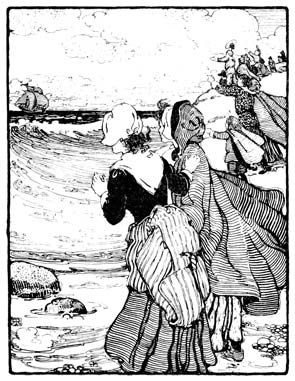
It might be that I could give you, by the aid simply of words, some faint idea of how we suffered during the time of starvation, of sickness, and of death; but it is impossible for me to set down that which shall picture the heartfelt rejoicings and fervent thanksgiving that were ours at thus knowing we were soon to have enough with which to drive death from our doors. 75
It was a time of the wildest excitement. I hardly know what Susan and I did or said on that day, save that we dressed hurriedly, running down to the very shore of the cove, finding there nearly every person in Boston, and stood with the water lapping our feet as we watched the oncoming of the ship which was bringing relief.
Never before had I thought a vessel could be beautiful; but I have not seen a fairer sight than was the Lyon on that morning, and before night came, our stomachs, which had been crying out in distress because of lack of food, were groaning through being overly well filled.
The time of famine had passed, at least for this season, and it was as if the sick began to gain new life, and health, and strength, simply through knowing that we were no longer in such dire straits.
Governor Winthrop gave voice to his relief and pleasure by ordering, even before the Lyon had come to anchor, that the fast which had been appointed for the next Thursday should be a day of thanksgiving instead, and so we made it, with prayers all the more fervent because of our stomachs being well filled, and the fear of dying by starvation being put behind us. 76
The ship was loaded with such things as wheat, peas, oatmeal, pickled beef and pork, cheese and butter, and, with what my mother declared was of the greatest value, lemon juice, which is said to be a remedy for those who are suffering with scurvy.
It was not allowed that those who had money should buy plentifully of this cargo; but it was paid for by the town authorities, and divided equally among us all.
When the day for thanksgiving came, my mother allowed me to have an unusually hearty breakfast, for, she said, there was so much for which to be thankful, and so many who would be present to give thanks, that no one could say when we might be able to have dinner.
It was well she was thus thoughtful, for one of the preachers who came over with us, Master Wilson, preached, while Governor Winthrop treated us to a lecture, and Master Phillips was so blessed with the spirit that he prayed a full hour.
Susan and I feared we would have yet more preaching, for on the ship Lyon had come a young man whom my father said was gifted, and Susan's father believed he would make his influence felt among us. It was Master Roger Williams, and I am ashamed to say that I sat in fear and trembling lest Governor Winthrop should call upon him for a sermon, after we had already had much the same as two; but, fortunately, 77 so it seemed to me, Master Williams did not raise his voice during the service.
It was near to night before we were done with giving thanks, and then at each home was held a feast.
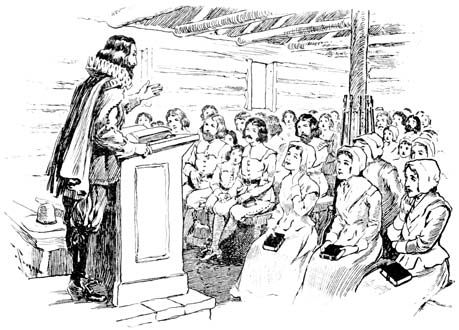
During Governor Winthrop's lecture on this thanksgiving day, he urged that all the people, children as well as grown folks, should take this time of famine as a lesson, reminding us that it would not be a long while before we could hope to reap a harvest, and in the meantime there was very much of labor to be performed.
He declared that even with the cargo of the Lyon, we had not enough to satisfy our wants until crops could be gathered; but it was certain other ships would come to Boston during the summer, with more stores. Yet 78 because of its being possible we might come to a time of suffering again, so must we be careful that not the smallest grain of wheat be wasted.
When the spring had come, and before it was time to put seed into the ground, our fathers set about building a defense for the town.
If you remember, I have already set down that this new village of ours was on a point, connected with the main coast only by a very narrow strip of land. Now to defend our town from an attack by enemies, save they should come by water, it was only necessary the defence be built on this narrow neck, or strip, and so it was built.
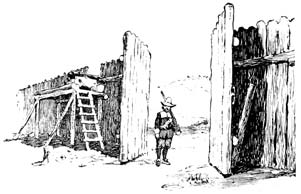
From one side to the other, extending even down into the water, was a palisade, or fence, of heavy logs, in the middle of which stood a gate to give entrance, and the law was that it should be shut at sunset, not to be opened again until day had dawned. 79
Since coming here we have seen so many Indians as to become acquainted with them, which is to say, that we no longer look upon them as savages, and have no fear to stand in the road when they pass. But those whom Susan and I had seen, up to the day when Chickatabut, the chief man of the Massachusetts tribe, came, were only common people, and such servants as are employed here in the town, for you must know that more than one family has a Narragansett Indian, or, mayhap, a Nipmuck, to work in the house.
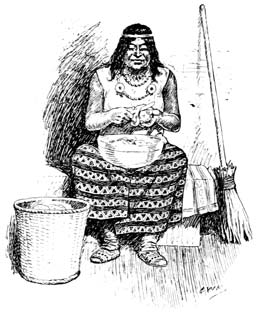
Mother says that she would rather do all the work of the house alone, than have one of the brown women to help her, for they are not cleanly to look upon, but as for myself, I think I could stand the sight of one of them, especially when it comes to soap making, of which I will tell you later. 80
Of course there are times when housewives must have some one to aid them, and those girls or women among us who would go out to work in the house are not many in numbers, therefore one must put up with the Indians, which is unpleasant, or take those who are known as indentured servants, meaning the people who have agreed with the Massachusetts Bay Company to work for so many years, in order to pay for their passage over from England.
As for these last people, mother will not have them in the house, because of being afraid that we may not get one of good morals. Therefore in our home mother and I do all that is needed, rather than have around us people of whom we know nothing.
It was not regarding the Indians, or free willers, as indentured servants are called, that I intended to write when I began. That which I counted to say was, that when the spring had come, after the arrival of the Lyon, and we were free for the time being from fears of a famine, the Indian by the name of Chickatabut came to see Governor Winthrop, having been invited to the end that he might sell us, who are here in Boston, this piece of land on which we are building our town.
You must know that he is quite the most important 81 savage roundabout here, and father believes, as does Governor Winthrop, that if he sells us the land, it will be a lawful bargain, because of his standing, as I have said, at the head of all these brown people nearabout.
Now it so chanced that he was the first savage of note I had seen, and really he was something grand to look upon. He had feathers on his head, like unto a crown, and from this drooped a long trail of feathers reaching to the ground, while his leggings and doublet of tanned deer skin were covered with beads, worked in fanciful patterns, together with the claws of beasts. His arrows were carried across his back, in a covering embroidered with the quills of the porcupine painted in various colors, and he held his bow in his hand.
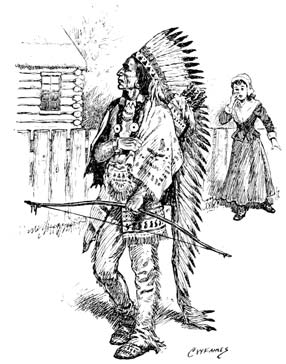
I cannot set down as I would, exactly how he was dressed, because, having come upon him suddenly while on my way to Susan's 82 house, of being startled by so much of adornment that I was like to have run away.
He came, as I have said, to visit Governor Winthrop, and father declares that he sat at the table as a white man would have done, save that instead of using the knife and spoon, he took up food with his fingers. Mother thinks that the Governor must have been relieved indeed when his guest departed, for no one insists so strictly upon proper table manners as does Master Winthrop.
It must have been that Chickatabut was pleased with his visit, for two or three days after having gone back to his people, he sent the Governor as much Indian corn as would fill a hogshead, and, in return for the gift, Master Winthrop presented him with a suit of clothing made in English fashion by a tailor.
Father says that now indeed do we own all the land this side of the neck, for Master Blackstone, who had a farm here, as I have already said, sold it to our people before we moved over from Charlestown, and now with Chickatabut's selling of the same, there should be no question as to who has a lawful claim upon it.
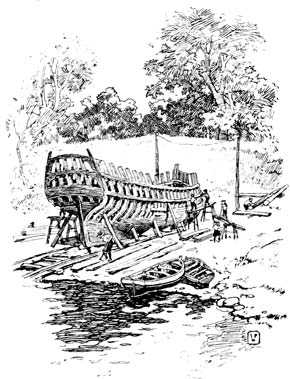
Although, in my own mind, there was never any doubt but that the land was rightfully ours without consulting 83 a savage about it, yet I believe, from all I heard said, that our people felt better in mind after this Indian chief had agreed to our staying here, for it seemed as if he had no sooner made the bargain than work was pushed forward more as it would have been done in England.
As for instance, Governor Winthrop began building a vessel, and now, if you please, we are to have a ship of our own, made in Boston, launched in Boston, and to sail from Boston.
When she is finished, and has sailed to Southampton or Liverpool, the people there must begin to believe that we of the Massachusetts Bay Colony are getting well on in the world if we can own fleets, for in case one vessel can be built, there is no reason why we should not have many, while there is so much of lumber everywhere around. 84
Do you know what a betty-lamp is? We have two in our house, which were brought over by Captain Pierce of the Lyon, as a gift to my mother.
You, who have more or less trouble with your rush lights, cannot fancy how luxurious it is to have one of these betty-lamps, which costs in care no more than is required to fill them with grease or oil.
Fearing lest you may not know what these lamps are, which Susan's mother says should be called brown-bettys, I will do my best to set down here such a description as shall bring them before you.
The two which we have are made of brass; but Captain Pierce says they are also to be found of pewter or of iron.
These are round, and very much the same shape as half an apple, save that they have a nose an inch or two long, which sticks out from one side. The body of the bowl is filled with tallow or grease, and the wick, or a piece of twisted cloth, is threaded into the nose, with one end hanging out to be lighted.

Ours hang by chains from the ceiling, and the light which they give is certainly equal to, if not stronger than, that of a wax candle; but they 85 are not so cleanly, because if the wick be ever so little too long, the lamps send forth a great smoke.
Father says he has seen a phœbe-lamp, which is much like our betty-lamps, save that it has a small cup underneath the nose to catch the dripping grease, and that I think would be a great improvement, if indeed it is possible to improve upon so useful an article of household furniture as this.
Speaking of our betty-lamps reminds me that Susan's mother had sent over to her in the Lyon, a set of cob irons, which are something after the fashion of andirons, or fire-dogs, save that they are also intended to hold the spit and the dripping pan. She had also a pair of "creepers," which are small andirons, and which she sometimes used with the cob irons.
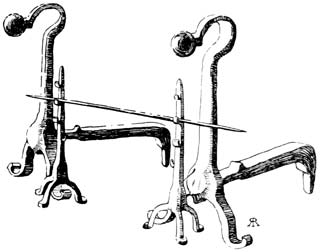
The andirons which we brought from England are much too fine to be used in this fireplace, which is filled with pothooks, trammels, hakes, and other cooking utensils.
They were a wedding present to my mother, and are in what we call "sets of three," meaning that on each 86 side of the fireplace are three andirons; one to hold the heavy logs that are at the bottom of the fire; another raised still higher to bear the weight of the smaller sticks, and a third for much the same purpose as the second; or, perhaps, to make up more of an ornament, for they are of iron and brass, and are exceeding beautiful to look upon.
I have used the words trammels and hakes, but it is possible that you may not know their meaning, and so I will add by way of explanation that though they are both hooks upon which we may hang pots and kettles, the trammel is so constructed that it may be lengthened or shortened, being made of two parts.
There is no good reason why I should make any attempt at setting down here all that was done by our people in the way of planting, in order that we might have such a harvest in the fall as would put far from us the fear of another famine.
It should be easy for you to fancy how we are employed here in this new town. Some of the men are working at the palisade, or barricade on the Neck; others are in the field planting and hoeing, while yet another company is in the shipyard on the Mystic River. 87
Ten or twelve of the people are constantly fishing, or hunting, to add to the food supply, while those servingmen or laborers who are not skilled at other work are cutting trees into fuel, and otherwise clearing the land that it may be tilled another year.
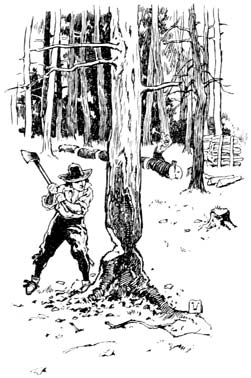
The women and children are no less busy, and it is easy for you to guess what their duties are. These log houses, while not requiring as much care as if they were mansions, need very much in the way of woman's work.
Lest the shiftless ones, who have no pride in the appearance of the town, or are too lazy to do other than what may be absolutely necessary, should allow the dirt to gather round about the outside of the houses, a law has been made obliging each person to keep free from dirt or filth of any kind, all the land surrounding his dwelling for a distance of fifty paces, whether in the street or garden, and it is upon us children that this last work falls. 88
Save for the babies, and those who are abed with sickness, there are no idle ones in Boston, and well indeed it should be so, for it surely is true that "Satan finds some mischief still for idle hands to do." If we were not busily engaged during all the waking hours, then would we have opportunity to grow homesick, for much as we are growing to like this New World, there will come now and then thoughts of the homes we left in England, and one's heart falls sad at realizing that, perhaps, never again will we see those whom we left behind when the Arabella sailed out of Southampton.
It is not well that I let my mind go back into the past. I should think only of the future, and of what we are doing here in Boston, the most important of which just now is the launching of our ship.
She is what sailors call "bark rigged," which is the same as saying that she has three masts; but yet not as much of rigging as a ship.
Her name, painted on the stern, is Blessing of the Bay, and there is hardly any need for me to say that every man, woman, and child in the town stood near at hand to see her as she slipped down the well greased ways into the river, where she rode as gracefully as a swan.
I have already said that when the Lyon came in, at 89 the time of the famine, she appeared the most beautiful vessel I had ever seen, and next to her comes the Blessing of the Bay. As Governor Winthrop said in the short lecture he gave us before launching, she was Boston made, of Boston timber, and would be sailed by Boston sailors, so that when she goes out across the ocean, people shall know that there are Englishmen far overseas who are striving, with God's help, to make a country which shall one day stand equal with the England we have left forever.
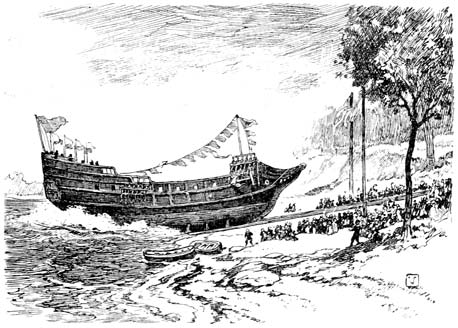
It is while speaking of the launching that I am reminded of a very comical mishap to Master Winthrop, and I may set it down without disrespect to him, for he 90 is pleased to join in the mirth whenever it is spoken of as something to cause laughter.
It seems that the wolves had been worrying some of the goats that Master Winthrop brought over to this country with him, and on a certain day, after supper, he went out with his gun in the hope of killing a few of the ravenous beasts.
He had not traveled more than half a mile from home when night came on, and, turning about to go back, as was prudent, for it is not safe that one man shall be alone in the forest after dark, because of the wild animals, he mistook his path, wandering directly away from the river, instead of toward it.
I myself have heard him say that he must have walked a full hour, and was growing exceeding uncomfortable in mind, when he came to an Indian hut that was built of branches of trees and of skins, so that it formed a fairly comfortable dwelling, and was of sufficient strength to resist the efforts of any one to enter, save through the door.
There was no person inside this hut or wigwam; the door was unfastened, and the Governor, understanding that he must have some shelter during the night, else was he in danger of being devoured by wild beasts, entered as if it were his own dwelling. 91
With his flint and steel he built a fire, and by its light, saw, piled up in one corner of the place, mats such as the savages use to sleep upon. Having taken a mouthful of snakeweed, which is said to be of great benefit in quieting one's nerves, and prayed to God for safe keeping during the night, he lay down.
Before much time had passed, and certainly while his eyes were yet wide open, it began to rain, and some of the water finding its way through the carelessly thatched roof, disturbed his rest, so that it was impossible to sleep.
He spent the night singing psalms, gathering such wood as he could handily come at from the outside, to keep the fire going, and pacing to and fro in the narrow space, until near to daylight, when an Indian squaw came that way.
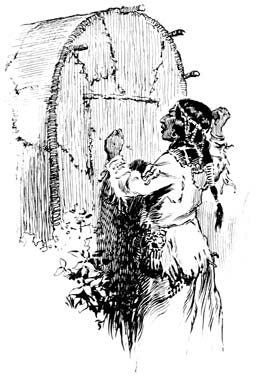
The Governor, hearing her voice as she cried out to whosoever owned the hut and was evidently a friend of hers, barred the door as best he might, while she stood on the outside beating it with her 92 hands, and calling aloud in the Indian language, first in friendly terms, and then angrily; but yet he made no reply.
The door held firm against her efforts until day came, when the Governor walked out of the hut, not dreaming the woman would make an attack upon him, but straightway he was forced to take to his heels, or, as he laughingly declared, she would have clawed out his eyes.
Although we children knew nothing whatsoever concerning it, the chief men of the town had been greatly alarmed because of the Governor's disappearance, and during the whole of the night no less than twenty had walked to and fro in the forest hunting for him; but by an unkind chance never going in the direction of this hut. When Master Winthrop made his appearance, it had just been decided that a hue and cry should be raised, and all the men in Boston be called to aid in the search.
It was during this summer, when Captain Pierce brought the Lyon to us for the third time, that Mistress Winthrop, the Governor's wife came over.
John Eliot, the preacher, was also one of the passengers, and they had even a longer voyage than had we in the Arabella. 93
The Lyon left Southampton about the middle of August, and did not arrive here until the fourth of November, when she came to anchor off Nantasket.
Then indeed did we have a week of rejoicing, sharing in the Governor's gladness that his family was with him once more. All those who could get boats to convey them, went down off Nantasket, and when Mistress Winthrop stepped ashore at the foot of our cove, she was honored by volleys from all the firearms in the town.
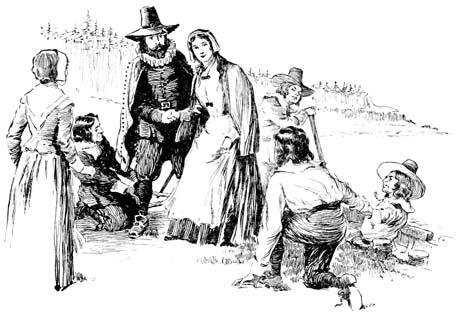
During three days that followed, it was as if the people believed Master Winthrop and his loved ones were in danger of starvation, for, from the highest to the lowest in the town, each brought some gift of food, 94 such as fat hogs, goats, deer meat, geese, partridges,—in fact, anything that could be eaten, save clams, fish, and lobsters, of which we had already more than plenty enough to dull one's appetite for such eating.
Those who read what I have here set down, may charge me with speaking overly much concerning what we had to eat, and yet I question whether any of our company who passed through the famine of the year of 1630, and the pinching times of 1631 and 1632, could do otherwise than dwell upon our store of food.
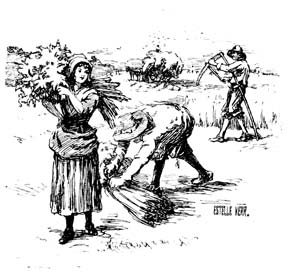
Now, if you please, I will set down at once that which is in my mind concerning it, so that I need not weary you by repeating. This first year of harvest was a fairly plentiful one, and would have sufficed for all our wants during the coming winter, had it not been that other people were joining us by every ship, nearly all of whom were poorly provided for, having 95 left England in the belief that we were dwelling amid plenty.
Therefore it was, that to feed these new comers as well as ourselves, we were frequently hard pressed for what was actually needed to save ourselves the pangs of hunger.
It is true that during this summer of 1631 many cattle were sent from England; but so many died during the voyage, that those which lived seemed extremely precious, because from them were we counting on our future herds. People who had spent their money in England buying twenty cows, but succeeded in bringing to Boston only four, could not afford to kill them for the sake of meat, more especially since the very life of our colony depended upon their increase.
We had famine in the first year; we were cramped for food during the second year, yet consoled ourselves with the thought that when another season had come, there would be so much seed put into the ground that there could be no question of lack of whatever might be needed.
But the summer of our third year in Boston was cold and wet; the crop of corn failed almost entirely, and again were we forced to seek our food from the sea, or to dig for clams; but even this last was extremely difficult, owing to the exceedingly cold winter of that season.
The Charles river was frozen from shore to shore, 96 and it was as if the snow fell almost every day, until the drifts were piled so high roundabout our town that, save in the very center of the village, we could not move about.
Another famine was staring us in the face when the winter came to an end, and we knew that unless help should reach us from the outside, we could not add to our stores until another harvest time.
Then it was that we realized the value of having neighbors, and truly these were neighbors indeed, who, at Jamestown in the New World, had such store of food, as would allow them to lade a ship wholly with corn, sending her, through God's direction, to that port where the supply was most needed.
Lest I weary you with too many words regarding our hunger, I will set it down thus briefly, that, except at rare intervals, we were pinched for food during the first five years we lived in Boston, and not until that time had passed were we free from further fear of famine.
And yet we did not spend all our time complaining one to another lest on the morrow we should be hungry, and in proof of this I am minded to set down here that which I have copied from the law made in our town four years after we came across from Charlestown: 97
"That no person, either man or woman, shall hereafter make or buy any apparel, either woolen, or silk, or linen with any lace on it, silver, gold, or thread, under the penalty of forfeiture of said cloths. Also that no person, either man or woman, shall make or buy any slashed cloths, other than one slash in each sleeve, and another in the back; also all cut-works, embroideries, or needle-work, capbands, and rails are forbidden hereafter to be made and worn under the aforesaid penalty; also all gold and silver girdles, hatbands, belts, ruffs, beaver hats are prohibited to be bought and worn hereafter."
Mother says it is because of our people having given themselves up to vanity that the Lord laid His hand heavily upon us by cutting off the harvest, and yet it seems to me, although I question not that which she has said, that the good God would never punish all our people for the sin which a few committed.
Yet, perhaps, there were more than a few who committed the sin, else why should it have been that our wise men felt it necessary to forbid fanciful dress, as they did in this law which I have set down?
Not until the second year after Boston was settled, did we have a building devoted entirely to the worship of God. Then was built of logs, neatly hewn and set together with much care, so that both the outside and the inside were smooth and fair to look upon, that which we called our church. 98
The sides did not stand as tall as some of our dwellings; but the roof was much higher and sharper, so that inside it looked to be very large. There were four windows in each side, and all of them contained glass, if you please.
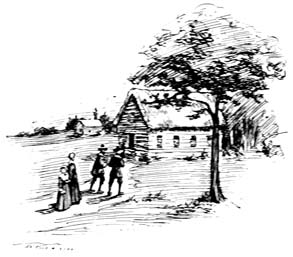
The pulpit, with a well fashioned sounding-board of odorous cedar above it, stood at the end of the building farthest from the door, and there were near about it eight pews made much after the same shape as those in the church at home. In these sit the magistrates, the elders and the deacons, with the men on one side, the women and girls on the other, and the boys in one corner, where the tithing-men may keep them in order.
Back of these pews were benches sufficient in number to give seats to all our people, and if it could have been that Master Winthrop and those in authority believed we might worship God quite as well while comfortable in body, so that we had a fireplace, it would have delighted me much.
It seems almost a sin to complain because of being cold while one is praising God, and yet during this long, 99 dreary winter when the earth was piled high with snow, and the river imprisoned in ice, it was well nigh impossible, after having remained in the same position two or three hours, to prevent one's teeth from chattering so sharply that the noise might disturb others.
It seems to me that one could enjoy a sermon much better if one were not wishing for the warmth of the fireplace at home.
Many of our people have what is called a foot-stove to take with them to meeting, and it seems to me a most comfortable arrangement; but mother says that if our love of God be not strong enough to prevent discomfort simply because of the frost, when such a man as Master Wilson, or either of the preachers, or Governor Winthrop, is pleased to deliver a sermon, then are we utterly lost.
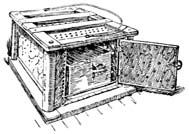
Susan declares that she was lost the first winter we came here, when her cheeks were frost-bitten during one of Master Winthrop's lectures, which took no more than two hours in the speaking.
These foot-stoves, which I wish most fervently my father would believe we might be permitted to use, are square boxes made of iron, pierced with many tiny holes, and having a handle by which they can be carried. 100 One of these, filled with live coals, will keep warm a very long time, especially if it be covered with skins, and I envy Mistress Winthrop and her daughter, even while knowing how great is the sin, when they sit in the Governor's pew so comfortably warm that there is no fear their teeth will, by chattering, cause unseemly disturbance.
There are certain matters concerning which I was minded not to speak, because of their causing both Susan and me very much of sadness at the time, and it has seemed as if I had set down little else except trouble and suffering, whereas there was very much of the time when we of Boston enjoyed our life in the New World.
That some will not live as God would have them, we know only too well, and we found one such among us during the second year after our village was built. Thomas Morton was the person who gave the officers of Boston no little trouble, and in order to tell understandingly the story of what he did, I must go back to that time, two years before we landed here, when the people of Plymouth had cause to complain against this same man.
From what I have heard father say, he had been a lawyer in the city of London, and came over to Plymouth 101 hoping to better his fortunes; but because of not being a God-fearing man, the religious spirit of the colonies was little to his liking.
Within five or six miles of where stands our village, had been, a few years before, a settlement which one Captain Wollaston began, and, tiring of the enterprise, went back to England, leaving there some few of his followers, who were ungodly people.
This Thomas Morton, believing himself held in too close restraint at Plymouth, sought out these people at Wollaston, and became one of them, to the shame and reproach of all godly-minded people in this New World. He changed the name of the village to Merry Mount; was chosen leader of the company there, and made of the place a perfect Sodom.
It is said, so I have heard my father say, that they had no religious services, save now and then, when in a spirit of wickedness this Thomas Morton read from the prayer book. He increased the number of his following by enticing the servants away from the good folks of Plymouth.
It gave much offence to them that such a village should be in the land where they had come to set up the true worship of God, therefore Captain Miles 102 Standish, a soldier of Plymouth, went with a force of men to Merry Mount, seized this Thomas Morton, and sent him to England that he might answer for his crimes to the London Company.
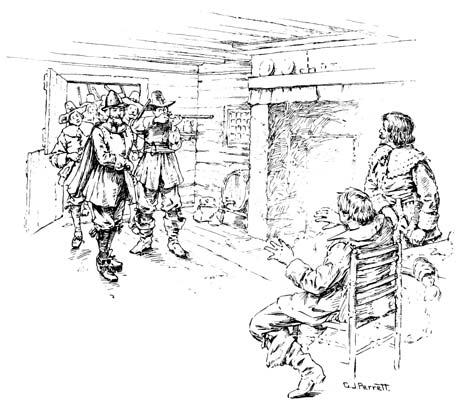
What happened there my father does not know; but certain it is that when the Lyon came on her second voyage, she brought among her passengers this same 103 Thomas Morton, and from the moment he arrived our people had trouble with him.
He brought considerable property in the way of firearms, powder and shot, and, without asking permission from the chief men of our town, set about trading these goods with the Indians for furs, as he had done at Merry Mount, which was not only a menace to all the white people in this new country, because of furnishing the savages with arms that might be used to kill us, but directly against the law which forbade trafficking with the Indians.
He must have been a wicked man indeed, for, not content with doing that which our people had forbidden, he cheated the savages by selling them black sand for powder, and demanding more of furs than was fair and just for such goods as he gave them.
Of course one may think that his crime against us was lessened when he weighed out worthless sand, instead of powder that might be used to our harm; but the chief men of Boston claimed that the savages must be dealt with fairly, otherwise would they look upon us, who were willing to trade honestly, as rogues and thieves.
Therefore it was that our people seized this Thomas Morton, gave him fair trial before the court, and sentenced him to four and twenty hours in the bilboes, after which he was again to be sent as prisoner to England. 104
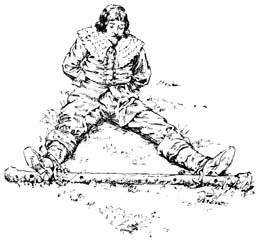
It may be that some do not know what bilboes are, and I can explain because of having seen them while they were on Thomas Morton.
A bilboe is a long bar of iron, on which are two heavy clamps, in shape not unlike bracelets which ladies of quality wear upon their arms, fastened by a ring to the bar in such manner that they may slide back and forth. These clamps, or clasps, are placed upon the prisoner's ankles, and pushed apart until his legs are stretched wide. His hands are tied behind his back, and he is forced to sit upon the ground, unable to give relief to his aching limbs, because of the bar's being too weighty for him to move it.
All of Thomas Morton's goods were seized to pay the charges of the trial, and also to make good to the Indians what they had lost through his knavishness. The house which he had built, and it was a fair one made of heavy logs, was burned in the presence of the prisoner and the court, as a sign that we of Boston would not countenance dishonest tricks, even when they were played upon the savages. 105
The punishment of Thomas Morton saddened Susan and myself sorely; but not so much as when one Philip Ratcliff was punished.
He was such a wicked man that he went around the town saying he believed the devil was at the head of our church, and in every way casting reproach upon religion, despite the fact of his having been warned again and again that unless he put a bridle to his tongue, punishment would speedily follow.
He did not give heed to the warning, however, and after a time, which was during the third summer of our being in this land, he was brought before the court as one who had cast reproach upon God. For this he was sentenced to be whipped, to have his ears cut off, to be fined forty shillings, and afterward to be banished to England.
Because of this man's being so very, very wicked, Susan and I believed we should go to see him whipped, and gathered with the people at the pillory, where he stood with his neck and arms clutched by the heavy bars of wood; but when Samuel Morgan made ready the heavy whip, just as the man's back was bared to receive the lashes, we turned away in horror, not daring to look. 106
Father said, when he came home in the evening, that Ratcliff bore the whipping and the ear-cutting without a cry; but when it was over, he threatened vengeance against us, after he should be set free in England, and later we came to know what he meant by such threats.
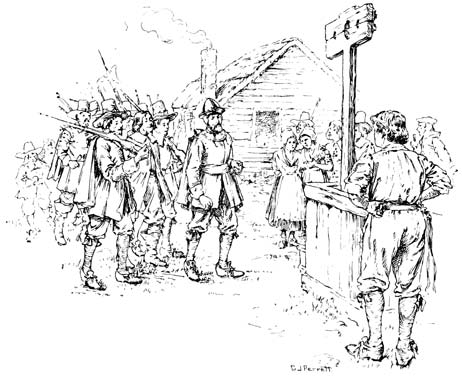
He went everywhere about in the old country, telling that the New World was a hideous wilderness in which roamed the wildest savages thirsting for the blood of white people; that the land was rocky and barren, and not fit for farms, for no crops could be raised upon it; that the weather was cold, and that the climate caused deathly sickness. 107
All this, father said, worked to our harm among those godly people who were inclined to join us, for they feared to come into such a place, not understanding that these things were lies which had been told out of a spirit of revenge.
Another wicked person who had come to Boston was Henry Linn, who was no sooner living among us than he wrote letters to England by every vessel, full of slander against the churches, and of those who took part in the government.
He was forced to stand in the pillory from sunrise to sunset, and was then sent back to England with the warning that if he ever returned, worse punishment would follow.
It has come to my mind that possibly some who read these words may not have seen a pillory, for I am told that there are places in this world where the people so fear God and love their neighbors that there is no need they be punished, therefore will I set down as best I may, a description of that instrument of shame that stands near to where lives Master Wilson.
First a platform of logs is made of such height that he who stands upon it can be seen of all the people, and from the center of this rises a stout log to the height 108 of four feet or more. On the top of the upright timber, and fastened immovable, is a puncheon plank on the upper edge of which are cut three grooves, the middle one large enough to contain a man's neck and the other two his wrists. Now a second plank is fashioned to fit down over the first one, with other grooves in it to match.
Whosoever must be punished is forced to stand upon this platform with his head and arms fastened securely in the holes of the planks, exposed to the view of all the people during so long a time as the sentence demands.
In addition to being a most shameful punishment, it must be exceeding painful, for one may not stand very long in the same position without becoming cramped, and he who is in the pillory cannot move hands or head.
I grieve to say that there were some among our people who seemed to believe there was nothing of crime that could be committed against a savage, and Master Josias Plastow, whom we had ever looked upon as a godly man, showed himself to be knavish where the brown people were concerned.
Chickatabut, the chief of the Massachusetts Indians, 109 of whom I have already spoken, brought proof to Boston that Master Plastow had stolen three half-bushels of corn from some of his people, living near Neponset, and on being charged with the offence by Governor Winthrop, Master Plastow confessed that he had done so, claiming that it was not stealing to take from the savages.
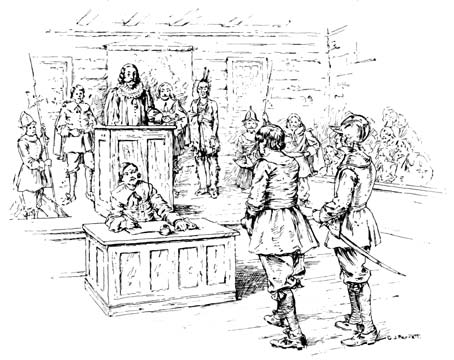
The Governor and his assistants thought differently, though, for Master Plastow was fined five pounds in money, and ordered to send six half-bushels of corn to the Indians from whom he had stolen, after which all people were forbidden to call him Master any more, but must give him only the name of Josias. 110
Captain Stone believed this sentence to be wrong, and openly called the justice unseemly names. He was straightway summoned before the court, and fined one hundred pounds in money for speaking disrespectfully of one in authority.
Nor was this the only case where fault was found with the punishment inflicted upon Josias. Henry Lyon wrote a letter to a cousin of his in Plymouth, another to a friend in Salem, and sent four to London, all of which were filled with harsh words against the Governor of Boston, and the manner in which justice was dealt out. He was given twelve lashes on the bare back, and banished to England.
When we had been in this village two years, there was much vexation because of the greater portion of the gold and silver money, which our people had brought with them, having been sent back to England in order to purchase goods there, and the result was that even those who were well off in the things of this world, found themselves unable to pay their debts.
Therefore it was that the court ordered corn to be taken in the stead of gold and silver, unless money, or beaver skins, were set down in the writing as the method of payment agreed upon. 111
At the same time another law was passed, part of which seemed to bear heavily upon those who were homesick to the point of going back to England, and yet may have offended the officers of the law in some way. It was declared that no person should be allowed to depart out of the town of Boston, either by sea or by land, or to buy goods out of any vessel or of the Indians, without permission from the magistrates.
I know it is not seemly for a girl to question that which her elders have done, and yet there were many times when it seemed to me as if such a law worked injury to us of Boston.
I might not have given so much heed to matters which do not concern girls, but for the fact that Susan's father had crossed the Neck on his way in search of wild animals, and having come some four miles into the forest, he met an Indian who had on his back a half-bushel of corn in a basket.
The savage took a fancy to the girdle he wore, offered to give him the corn, and bring as much more on the following day, if the belt were given to him then.
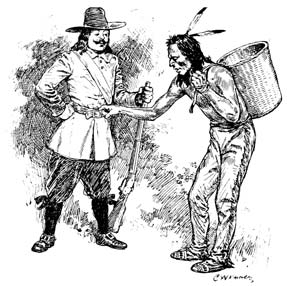
Susan's father, believing that the law against buying provisions of an Indian would not be carried so far as to prevent a bargain like the one which the savage had offered, stripped off his belt and took the corn.
On coming back to the town, Samuel Goodlove, one of the tithing-men, met him, and asked how it chanced he had set forth in search of wild fowl and brought back corn.
Thinking no harm, Susan's father told all that had been done in the forest, and straightway he was brought before Governor Winthrop, who fined him ten shillings and the corn he had brought on his back four miles, for having offended the law. In addition, he was sentenced to give back to the Indian as much corn as he had taken, but without demanding from him the girdle that had been given over.
Five years after we were settled in this town of Boston, a school was set up for young people, and such children of the Indians as wished to attend were allowed to do so freely without payment, although every white man was forced to pay each year a certain amount, either in money or in goods, for the hire of the teacher, who was Master Philemon Pormont.
It must not be supposed that we children knew nothing 113 whatsoever of reading, writing, or of doing small sums in arithmetic, up to this time. A certain portion of each day did my mother or father teach me my lessons, and when Master Pormont opened his school, I could write as fair a hand as I do now, which seems fortunate, for he was not skilful in teaching the art of writing.
As for myself, I truly believe that had my first lessons in the use of a quill come from him, I had never known how to form a letter, because of his being exceeding harsh in his ways.
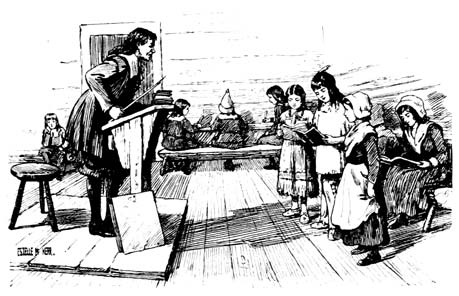
A child who failed in doing at the first attempt exactly as Master Pormont thought fit, was given a sharp blow over the knuckles of the hand which held the quill, and Ezra Whitman was punished in this manner so severely on a certain day, that it was nearly a week 114 before he was able to use his fingers. Even then the teacher declared that if the blow had been sharper, the boy would, before the pain had ceased, have known more about that which he was endeavoring to show him.
The school was first set up in the house that had been built by Josias Plastow. If you remember, he was one who had been under the discipline of the court, and it was forbidden any should call him save by the name of Josias.
Feeling that he had been harshly dealt with, Josias left Boston, and went into Plymouth to live, therefore did his dwelling belong to the town, according to the law. It was made into a schoolroom by having benches set up around the four sides, in such fashion that the scholars faced a ledge of puncheon planks, which was built against the walls to be used when we needed a desk on which to write, or to work out sums in arithmetic.
Master Pormont sat upon a platform in the center of the room, where he could keep us children well in view, and woe betide the one who neglected his task, for punishment was certain to follow.
There were times when it seemed to me as if Master Pormont had eyes in the back of his head, for once when I ventured to ask Susan Freeman for the loan of 115 her quill, while he was looking in the opposite direction, I was speedily called to an account for misbehavior. Then it was he handed me a knife he carried in his pocket, and further command was not needed.
I knew full well that I must go outside and cut a stout switch for use upon my own body, and if peradventure I had been so foolish as to bring back a small one, the first would have been used to switch me with until it was broken, after which it was my duty to go for another of more weight.
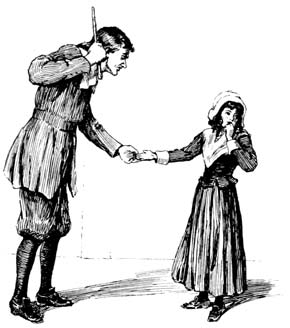
My hands smarted a full hour after the punishment had been dealt out, and there were such swellings upon them when I got home that mother tied both up in linen after besmearing them plentifully with ointment.
It was not always that Master Pormont used a switch upon a child who had been foolish enough to speak with his neighbor, for he had what were called whispering-sticks, which were most disagreeable to wear, and 116 caused a great deal of pain, so Susan said; but as for myself, I was never forced to bear such punishment.
These whispering-sticks were stout bits of wood from the oak tree, which could not readily be broken by the teeth, and were put into a child's mouth as you thrust a bit into the mouth of a horse, after which the two ends were bound securely back of the neck. Thus the unfortunate one's jaws were stretched wide open, oftentimes for a full hour.
It seemed to me then, and does even now, that Master Pormont spent more time devising means of punishment than in teaching us our lessons, for he had as many torture tools of various kinds as would have served to make a heavy load for either of us children.
That which the lads most feared was the flapper, and truly it was well contrived to cause pain. It was a piece of stout deer hide, or thick leather, four or five inches wide, and twice as long, with a hole in the center about as large as the end of my thumb. One end of this was tied to a stout handle, and, when applying it, Master Pormont forced the child who had disobeyed the rules of school, to lie over one of the benches in such a manner that he could come at the lad's bare skin. When the flapper was laid on vigorously, at each blow the 117 flesh would puff up through this hole in the center of the leather, in a way most painful to behold.
There is little need for me to say that Master Pormont had a number of dunce's caps made of bark from the birch tree, on which were painted different inscriptions to suit the offence, such as "Stupid Boy," for one who could not readily answer the questions he asked concerning the day's lessons; "A Silly Dunce," to fit one who was slow in learning; "A Wicked Liar," for some lad who had not told the truth.
In fact, I cannot set down all the names which Master Pormont had written on these dunce's caps, and there was hardly an hour during the day when at least one of them was not in use.
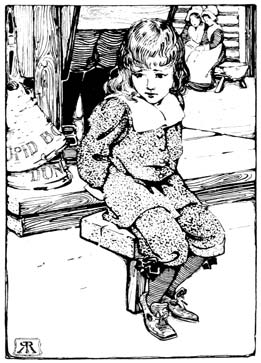
That contrivance which he had for children who would not sit quietly on their benches, was, seemingly, the most innocent, and yet, as I know to my sorrow, caused a vast amount of pain. It was a small square of puncheon plank with a single 118 stick in the center as a leg, and on this the culprit was forced to sit, balancing himself or herself as best might be by the feet, without being allowed to touch the hands to anything.
As I thus set down the poor description it seems a harmless thing, and a punishment too mild to meet a grave offence, but yet if you were to try to balance yourself on this unipod, as Master Pormont called it, for the space of an hour, every joint in your body would cry aloud with pain.
As for myself, I know that more than once I would rather have fallen headlong from this unipod, than have endured the torture a single moment, even had I not known that more severe punishment would follow such a disregard of the rules of school.
The first lesson which Master Pormont gave to those of us children who could read and write fairly well, was from the Latin grammar, and he required that we have at our tongue's end within the first day, the different forms of no less than six verbs; and this regardless of the fact that we had never so much as put our eyes to the language before!
Do not let it be understood that I am in any way complaining of whatsoever Master Pormont did, for 119 although I could not understand the reason for many of the lessons at that time, there can be no question but that so wise a man as he knew what was best suited for us children.
But surely, to Susan and me, who knew no more of arithmetic than was to be found in the multiplying, dividing, and adding of small sums, it was most grievous work to stumble over such terms as "fret," "tare," and "net," when we had no idea of their meaning.
Nor would Master Pormont give us such information, claiming that we should seek it from our parents, or from other people in the town, to the end that if it was gained by much labor we would the longer remember it.
To me it was a great relief when dame schools were established, and by this term I mean schools that were taught by women.
Some of our more tender-hearted people believed Master Pormont's methods were too harsh for the younger children; therefore, after he had kept school one year, Mistress Sowerby, who was the widow of Master Sowerby who had been assistant in the church at Yarmouth, in England, was hired at the wage of six pounds a year to teach the girls and the smaller boys. 120
She did not appear to think it necessary that young ladies should know so very much concerning Latin grammar, or arithmetic; but rather spent her time showing us how to spin tow strings, or to knit hose or stockings.
Because of the school's having been set up in her own home, we could learn how to cook, and to weave, and to knit, not only for our own use, but to sell, and any kind of knitting work done well was in great demand. When I could do herringbone, or fox-and-geese patterns, working them, moreover, into mittens or stockings, I felt exceeding proud.
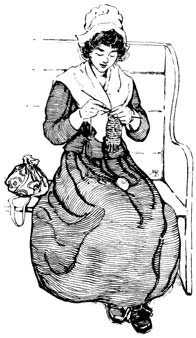
Indeed, we had among us one girl who knit into a single pair of mittens, the alphabet and a verse of poetry in four lines.
Mistress Sowerby was most careful in teaching us the use of the quill, for she claimed that the young girl or young woman, who could make easy, flowing letters, need not consider herself ignorant, even though she failed in arithmetic, or was unable to spell correctly the words she set down. 121
It seemed to Susan and me as if the people of Boston were taking great pride in the teaching of their children, when we learned that four hundred pounds had been set aside from the money of the town with which to set up a college, near those plantations which we had come to call the New Town.
We girls were more than disappointed, however, when told that only lads would be allowed to enter this college, and then not until having gained a certain amount of knowledge elsewhere; but yet it was a matter in which we could take pride, that there should be such a school formed when only six years had passed since we began to build the town of Boston.
It would be strange indeed if I failed to set down anything concerning the flax which we spin, because save for it we would have had nothing of linen except what could be brought from England. There is no question but that every one who reads this will know exactly how flax is raised and spun into cloth; but yet I am minded to explain, because we girls of Boston have more to do with raising flax than with any other crop.
It is sown early in the spring, and when the plants are three or four inches high, we girls are obliged to 122 weed them, and in so doing are forced to go barefoot, because of the stalks being very tender and therefore easily broken down.
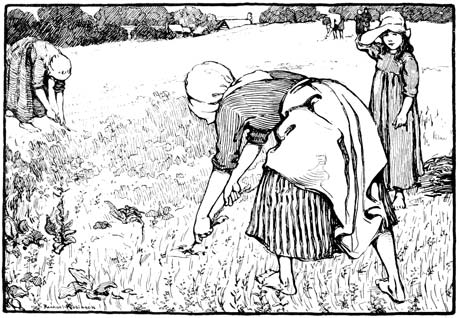
I do not believe there is a child in town who fails to go into the flax fields, because of its being such work as can be done by young people better than by older ones, who are heavier and more likely to injure the plants.
I have said that we are obliged to go barefooted; but where there is a heavy growth of thistles, as is often the case, we girls wear two or three pairs of woolen stockings to protect our feet.
If there is any wind, we must perforce work facing it, so that such of the plants as may by accident have 123 been trodden down, may be blown back into place by the breeze.
Wearying labor it is indeed, this weeding of the flax, and yet those who come into a new world, as have we, must not complain at whatsoever is set them to do, for unless much time is expended, crops cannot be raised, and we children of Boston need only to be reminded of the famine, when we are inclined to laziness, in order to set us in motion.
Of course you know that flax is a pretty plant, with a sweet, drooping, blue flower, and it ripens about the first of July, when it is pulled up by the roots and laid carefully out to dry, much as if one were making hay. This sort of work is always done by the men and boys, and during two or three days they are forced to turn the flax again and again, so that the sun may come upon every part of it.
I despair of trying to tell any one who has never seen flax prepared, how much and how many different kinds of labor are necessary, before it can be woven into the beautiful linen of which our mothers are so proud.
First it must be rippled. The ripple comb is made of stout teeth, either wood or iron, set on a puncheon, 124 and the stalks of flax are pulled through it to break off the seeds, which fall into a cloth that has been spread to catch them, so they may be sown for the next year's harvest.
Of course this kind of work is always done in the field, and the stalks are then tied in bundles, which are called "bates," and stacked up something after the shape of a tent, being high in the middle and broadened out at the bottom.
After the flax has been exposed to the weather long enough to be perfectly dry, then water must be sprinkled over it to rot the leaves and such portions of the stalks as are not used.
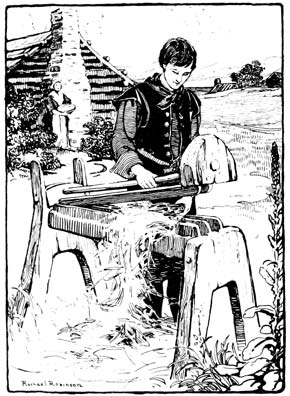
Then comes that part of the work which only strong men can perform, called breaking the flax, to get from the center of the stalks the hard, wood-like "bun," which is of no value. This is done 125 with a machine made of wood, as if you were to set three or four broad knives on a bench, at a certain distance apart, with as many more on a lever to come from above, fitting closely between the lower blades. The upper part of the machine is pulled down with force upon the flax, so that every portion of it is broken.
After this comes the scutching, or swingling, which is done by chopping with dull knives on a block of wood to take out the small pieces of bark which may still be sticking to the fiber.
Now that which remains is made up into bundles, and pounded again to clear it yet more thoroughly of what is of no value, after which it is hackled, and the fineness of the flax depends upon the number of times it has been hackled, which means, pulling it through a quantity of iron teeth driven into a board.
After all this preparation has been done, then comes the spinning, which is, of course, the work of the women and girls. I am proud to say I could spin a skein of thread in one day, before I was thirteen years old, and you must know that this is no mean work for a girl, since it is reckoned that the best of spinners can do no more than two skeins. 126
Of course the skeins must be bleached, otherwise the cloth made from them would look as if woven of tow, and this portion of the work mother is always very careful to look after herself.
The skeins must stay in warm water for at least four days, and be wrung out dry every hour or two, when the water is to be changed. Then they are washed in a brook or river until there is no longer any dust or dirt remaining, after which they are bricked, which is the same as if I had said bleached, with ashes and hot water, over and over again, and afterward left to remain in clear water a full week.
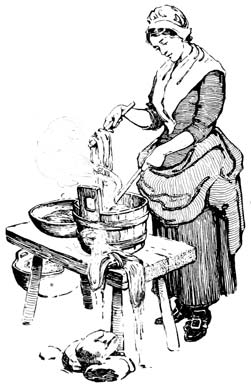
Then comes more rinsing, beating, washing, drying, and winding on bobbins; so that it may be handy for the loom.
The chief men in Boston made a law that all boys and girls be taught to spin flax, and a certain sum of money was set aside to be given those who made the best linen that had been raised, spun, and woven within the town. 127
I am told that in some of the villages nearabout, the men who make the laws have ordered that every family shall spin so many pounds of flax each year, or pay a very large amount of money as a fine for neglecting to do so.
It is not needed I should set down how flax is spun, for there is but one way to spin that I know of, whether the material be wool, cotton, or flax.
But I would I might be able so to set it down, that whosoever reads could understand, how my mother wove this linen thread into cloth; but it would require more of words than I have patience to write.
If there be any who have the desire to know how the linen for their tables, or for their clothing, is made, I would advise that the matter be studied as one would a lesson in school, for it is most interesting, and father holds to it that every child should be able to make all of that which he wears.
In this town of Boston, if we do not know how to make what is needed, then must we perforce go without, because one cannot well afford to spend the time, nor the money, required to send from Boston to London for whatever may be desired, and wait until it shall be brought across the sea. 128
I wonder if it would interest any of you to know what Susan and I are obliged to do in our homes during each working day of the week?
I can remember a time when we were put to it to perform certain tasks within six days, and have set down that which we did.
It was on a Monday that Susan and I hackled fifty pounds of flax, and tired we were when the day was come to an end. On Tuesday we carded tow, and on Wednesday each spun a skein of linen thread. On Thursday we did the same stint, and on Friday made brooms of guinney wheat straw. On Saturday we spun twine out of the coarser part of flax, which is called tow, and of which I will tell you later.
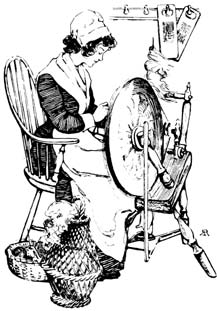
All this we did in a single week, in addition to helping our mothers about the house, and had no idea that we were working overly hard.
And now about tow: when flax has been prepared to that stage where it is to be hackled, the fibers pulled out by the comb are yet further divided into 129 cobweb-like threads, and laid carefully one above the other as straight as may be. To these a certain yellow substance sticks, which we call tow, and this can be spun into coarse stuff for aprons and mats, or into twine, which, by the way, is not very strong.
It would surprise you, when working flax, to see to how small a bulk it may be reduced. What seems like an enormous stack, before being made ready for spinning, is lessened to such extent that you may readily take it in both hands, and then comes the next surprise, when you see how much cloth can be woven out of so small an amount of threads.
As for myself, I am not any too fond of working amid the flax, save when it comes to spinning; but such labor is greatest pleasure as compared with soap-making, which is to my mind the most disagreeable and slovenly of all the housewife's duties.
It seems strange that some industrious person, who is not overly fine in feelings or in habits, does not take it upon himself to make soap for sale. Verily it would be better that a family like ours buy a quart of soap whenever it is needed, than for the whole house to be turned topsy-turvy because of the dirty work.
I wonder if there are in this country any girls so 130 fortunate as not to have been obliged to learn how to make soap? I know of none in Boston, although it may be possible that in Salem, where are some lately come over from England, live those who still know the luxury of hard soap, such as can be bought in London.
For those fortunate ones I will set down how my mother and I make a barrel of soap, for once we are forced to get about the task, we contrive to make up as large a quantity as possible.
First, as you well know, we save all the grease which cannot be used in cooking, and is not needed for candles, until we have four and twenty pounds of such stuff as the fat of meat, scraps of suet, and drippings of wild turkey or wild geese, which last is not pleasant to use in food, and not fit for candles.
Well, when we have saved four and twenty pounds of this kind of grease, and set aside six bushels of ashes from what is known as hard wood, such as oak, maple, or birch, we "set the leach."
I suppose every family in Boston has a leach-barrel, which is a stout cask, perhaps one that has held pickled pork or pickled beef, and has in it at the very bottom a hole where is set a wooden spigot.
This barrel is placed upon some sort of platform built to raise it sufficiently high from the ground, so that a small tub or bucket may be put under the spigot. Then it is filled with ashes, and 131 water poured into the top, which, of course, trickles down until it runs, or, as some say, is leached, out through the spigot, into the bucket, or whatsoever you have put there to receive it.
While running slowly through the ashes, it becomes what is called lye, and upon the making of this lye depends the quality of the soap.
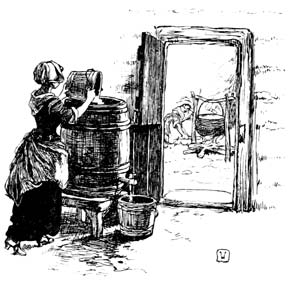
Now, of course, as the water is poured upon the contents of the barrel, the ashes settle down, and as fast as this comes to pass, yet more ashes are added and more water thrown in, until one has leached the entire six bushels, when the lye should be strong enough, as mother's receipt for soap-making has it, to "bear up an egg, or a potato, so that you can see a portion of it on the surface as big as a ninepence."
If the lye is not of sufficient strength to stand this test, it must be ladled out and poured over the ashes again, until finally, as will surely be the case, it has become strong enough.
The next turn in the work is to build a fire out of 132 doors somewhere, because to make your soap in the house would be a most disagreeable undertaking. One needs a great pot, which should hold as much as one-third of a barrel, and into this is poured half of the grease and half of the lye, to be kept boiling until it has become soap.
Now just when that point has been reached I cannot say, because of not having had sufficient experience; but mother is a master hand at this dirty labor, and always has greatest success with it.
Of course, when one kettle-full has been boiled down, the remainder of the lye and the remainder of the grease is put in, and worked in the same manner as before.
It is possible, and we shall do so when time can be spent in making luxuries, to get soap from the tallow of bay berry plums.
I have already said that we stew out a kind of vegetable tallow from bayberries with which to make candles, and this same grease, when boiled with lye as if you were making soft soap, can be cooked so stiff that, when poured into molds, it will form little hard cakes that are particularly convenient for the cleansing of one's hands.
There can be no question but that bayberry soap 133 will whiten and soften the skin better than does soft soap; but the labor of making it is so disagreeable that, as Susan says, I had rather my hands were tough and rough, than purchase a delicate skin at such an expense.
There is another household duty which frets me much, and yet it must be performed, else would we be put to it for quills with which to write, and for soft beds, pillows, and quilts. It is goose-picking that I abhor, not only because of its seeming extremely cruel, but on account of its being like the soap-making, dirty work.
I question if there be a family in Boston who does not own a flock of geese, and among them many who were once wild. They wander around the streets all summer, paddling the pools of water, chasing insects, and devouring whatsoever may have been thrown out of the houses that is eatable.
I doubt whether, if it were within the power of our preachers so to do, they would not kill all the geese in the town, for more than once on a Sabbath day have these noisy creatures made such a tumult outside the church that the sermon was actually interrupted.
Besides that, you cannot go anywhere without a 134 lot of foolish geese running at your heels, hissing as if you had done something for which you should be ashamed, and they were calling attention to it.
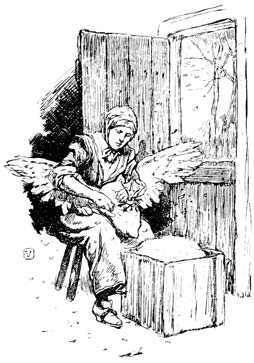
Twice each season, in the planting and the harvesting time, must the small feathers be stripped from the live birds, and while this is being done, the goose, which has a strong neck and beak, would inflict many a grievous wound if one did not pull an old stocking over its head.
Some people are so particular as to have made goose baskets, which in shape are not unlike small gourds, and through the narrow neck of these the head of the goose is thrust, while the body can be held firmly between the knees of whosoever is doing the plucking.
Of course, when one is pulling feathers from the bird, the fine fluff, or down, flies everywhere about like snow, and the result is, that unless you take the precaution of tying your hair up in cloths, and putting on an old linen dress from which dirt can readily be 135 shaken, you will be covered from head to foot with these fluffy particles, which are not much larger than snow-flakes, and extremely difficult to remove.
I have been so busy setting down matters concerning the household, as to forget that I should tell you how our town of Boston has grown, and who of the great men of England have come into it.
It was the third year after our coming, that Master John Cotton, the famous preacher, settled among us, taking upon himself, because of the entreaties of our people, the care of the First Church.
It was also in this same year that a new governor was chosen, much to the regret of both Susan and me, for while we girls could not be expected to know anything regarding the matter, it surely seemed to us that Master Winthrop was the very best man in all this world to rule over us.
But those who had the privilege of voting must have believed otherwise, for they elected Master Thomas Dudley in his stead, and made Master Winthrop one of the assistants in the Council.
With the exception of that, and the trouble which Master Roger Williams, the great preacher, was making, nothing disturbed us. Our town continued to 136 grow fast, until we began to believe that before many years had passed it would be even as great a city as could be found in England, with, of course, the exception of London.
Now as to the trouble which some of our people were having with Master Roger Williams: I should be able to set it down plainly, and yet it is not reasonable to suppose girls know much about the affairs of state.
A very great preacher was Master Williams, and one who took it upon himself to write, for the public reading, that the King had no right to sell or give land to us white people, because of the whole country's belonging to the Indians, and it can be well understood how much of a stir the matter caused.
Master Williams had been chosen by the people of Salem as teacher in their church, and when he declared that we had no right to hold the land which the King had granted us, which Master Blackstone had sold to us, and which Chickatabut had given to us in writing, the chief men of our town declared that he was not the kind of preacher who should be allowed to remain in the New World. Therefore they wrote to the people of Salem, demanding that he be sent back to England. 137
Of course our gentlemen of Boston must have been in the right, for I have heard my father say they were, and surely he would not lend his face to anything which was at all wrong. However, the people of Salem refused to listen to us of Boston, and, much to our surprise, Master John Cotton took sides with Master Williams, which seemed to me very strange.
I cannot say why it was that the people of the colony kept Governor Dudley in office only one year, or why Master Haynes was elected.
Master Haynes was, of course, ruler over the entire colony, and, as father said, not the kind of man to be trifled with by Master Williams, even though he was a preacher. Therefore, when Captain Underhill was about to sail for England, our Governor commanded him to take Master Williams back to London.
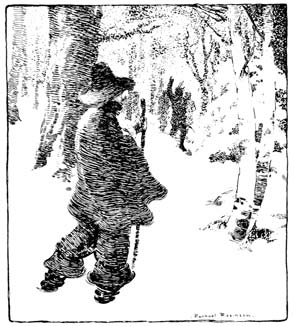
Some one, it seems, told the preacher what was on foot, and, although it was in January with the snow piled deep 138 everywhere around, he fled from Salem into the woods, trusting himself to the mercy of the savages rather than be sent back in disgrace.
I have heard that it was a bitterly cold day, with the snow blowing furiously, when the poor man plunged into the woods in flight, taking with him nothing whatsoever save that which he wore upon his back.
Father came to know afterward, that Master Williams spent the winter with the Pokanoket Indians, some of whom he had met during the short time he lived at Plymouth, and in the spring went to the shore of Narragansett Bay, where it was reported that he was trying to build up a village.
Quite the most distinguished person who came among us was Sir Harry Vane. His father was a Privy Councilor to the King, and one of the Secretaries of State in England. Because of wanting to see the New World, the young gentleman had been given permission to come to this country for a term of three years.
I wish you could have seen the stir that was made when he arrived. The Governor, with his soldiers and trumpeters, went down to the wharf to receive him with great ceremony, and the cannon on board 139 the ships were discharged with a wondrous noise when he stepped ashore.
He was a most pleasing man to look upon, so young and so courtly, while his costume was a marvel of elegance. It seemed to me, as I saw him taking the Governor's hand with so much grace, that we needed but few men of the same kind among us to lend great distinction to our town in America.
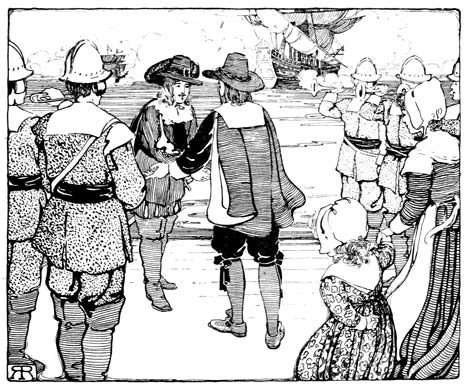
That same evening, however, my mother reproached me because of worldly thoughts, saying that fine feathers do not make fine birds, although they may 140 make a bird look fine, which I suppose is the same as if she had said that an evil man might, by his costume, be made to appear worthy, whereas he would not be so at heart.
However, I was not the only one in Boston who favored Sir Harry Vane, for before the year was over, when Master Haynes' term of office had expired, he was chosen as our Governor, and surely no person could have looked more kingly than did he, when he stood in the door of the Great House bowing to those people who had assembled in honor of his having been elected.
Susan and I had a right delightful time when the first warm days of spring came, for then it was the season in which to make sugar. I do not mean to say that we girls took any part in the sweet work; but on a certain day, very early in the morning, we were allowed to go out to Master Winthrop's plantation in New Town, there to see his people at the task, and, what was far better, we remained until late at night.
It was the first time I had been away from home, save to go over to Charlestown for a few hours, since we came from England, and I enjoyed it all the more because of its being something strange.
The snow was deep on the low-lying lands, therefore 141 we wore snow-shoes, and you must know that we girls can use those odd footings almost as well as do the Indian children. It was a long walk to New Town; but father went with us, his gun loaded heavily in case we came across a hungry wolf, and so great was the excitement of going abroad after having been kept in the house, except on those days when we went to meeting or lecture, ever since the winter began, that we gave no heed to fatigue.
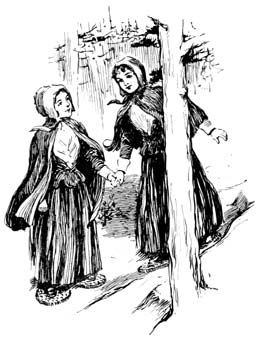
It seems queer that one can get sugar from trees, and yet so we do in this new country, otherwise there would be many times when we would not have sweet cake, for vessels seldom arrive from England with stores at the very moment when one is in need of this thing or that.
After we had arrived at Master Winthrop's plantation, good Mistress Winthrop went with us girls to see the sap drawn from the maples, and the three of us rode on a sled hauled by one of the serving men, of whom Master Winthrop has many. 142
Do you know how the sap is taken? Well, first a hole is bored in the trunk of a tree, about as high from the surface as will admit of placing a bucket beneath it, and into this a small wooden spout, or spigot, is driven. Beneath the spout is placed a bucket or tub, and into this the sap, coaxed up from the roots by the warmth of the sun, drops, or runs, very slowly.
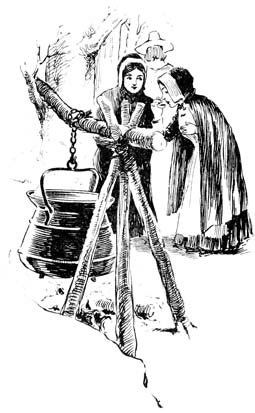
Master Winthrop's serving men made holes in many trees, and then, when the work had been done, went about gathering the sap out of the buckets or tubs, into casks, which were hauled from place to place on a sled, exactly as Mistress Winthrop, Susan and I had ridden.
As soon as a cask has been filled, a huge fire is built near at hand, and over it is hung a large kettle, much as if one were counting on making soap. In this the sap is boiled until it is thick, like molasses, in case one wishes to make syrup, or yet longer if sugar is wanted. 143
Of course it is necessary to taste of the syrup very often to learn if it has been cooked enough, and this portion of the work Susan and I did until we felt much as flies look after they have been feasting on molasses, and have their wings and legs clogged with sweetness.
I do not mean to say that we besmeared ourselves with it; but we ate so much while tasting to learn if the cooking was going on properly, that I felt as if I had been turned into a big cake of sugar.
When the sap is thick enough to "sugar," as it is called, it is poured into pans of birch-bark, where it cools in cakes, each weighing two or three pounds.
We enjoyed ourselves hugely until well after noon, when we were so weary and sticky that it was a positive relief to hear Mistress Winthrop propose that we go back to her dwelling, and there what do you think we found?
No less than twenty people from Boston, among whom were Susan's mother and mine, had all come out for what is called the "sugaring dinner."
Master Cotton, the preacher, was with the company, and he made a most beautiful prayer while we were waiting for the meal to be served, after which the spirit moved him to ask at great length, and in a most 144 touching manner, that the food might be blessed to each and every one of us.
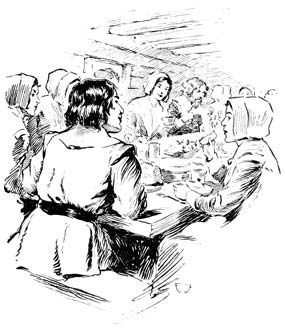
One could never have believed that we who were gathered around the table ever had known what it was to be painfully hungry during one entire winter, for there was sufficient of food to have served us, in the old days, a full week.
There were two enormous wild turkeys roasted to a most delicious crispness, one placed at either end of the table, while the handsomest standing salt I ever saw was exactly in the center, so that no one could say whether he was seated above or below the salt.
There were also two huge venison pies, with the pastry made wholly of wheat flour; and placed around the pies in a most tasteful manner, were potted pigeons, in small dishes. There were apple and pear tarts; marmalade and preserved plums, grapes, barberries and cherries, together with poppy and cherry water, cordial and mint water. 145
It was a most delicate feast, and my greatest regret was that I had tasted so often of the maple sap I could not do full justice to it. Tears actually stood in Susan's eyes as she whispered to me after the dinner was come to an end, and we were allowed to talk with each other,
"I shall never live long enough to cease being sorry because I could not eat more."
It was the same as if she had confessed to the sin of gluttony, and it was my duty to reprove her; but I could not find it in my heart so to do, because of much the same thought's being in my own mind.
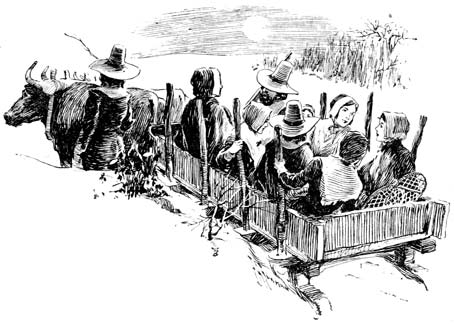
We all sang psalms until near to seven o'clock in the evening, when good Master Winthrop gave us a famous ride on his new sled drawn by two oxen, and thus did 146 we go home like really fashionable folk, who must needs turn night into day, as my mother declared.
I must tell you of our Training Day, in the month of May, after Master Roger Williams had fled into the wilderness to escape the wrath of our people which he had aroused; and I am setting down what happened on that particular day, because of its being the largest and most exciting training ever held in Boston, so every one says.
Susan believes Training Day should come oftener than four times a year, so that we young people may get some idea of what gay life is like in the old countries, where they make festivals of Christmas, and other saints' days. It does truly seem as if we might see our soldiers perform quite often, for it is a most inspiring spectacle, and especially was it on last Training Day, when, so father says, there were upwards of seven hundred men marching back and forth across the Common in a manner which at times was really terrifying, because of their fierce appearance when fully armed.
Imagine, if you can, a row of booths along the Common, in which are for sale ground nuts, packages of nookick, sweet cakes, pumpkin bread roasted brown 147 and spread with syrup made from maple sap, together with dainties of all kinds lately brought over from England.
Between these booths and the water are many tents, which have been set up that the people of quality may entertain their friends therein with toothsome food and sweet waters.
The middle of the Common, and a long space at either end, is kept clear of idle ones that the soldiers may exercise at arms, and these do not appear until the on-lookers are in their places. Then we hear a flourish of trumpets, the rolling of drums, and from the direction of the Neck comes our army, a mighty array of seven hundred or more men, all armed and equipped as the law directs.
When this vast body of warlike men have marched into the vacant space, they are drawn up in line, there is another flourish of trumpets, together with the rolling of drums, and Master Cotton comes out from the tent which has been set up for the use of the Governor and his assistants, to offer a prayer.
On this day, moved by the sight of the great throng, Master Cotton prayed long and fervently, whereat some of the younger soldiers, having not the fear of God in their hearts, pulled long faces one to another, or shifted about uneasily on their feet, as if weary with long standing, and I trembled lest the Governor, seeing 148 such levity, might rebuke them openly, which would be a great disgrace at such a time.
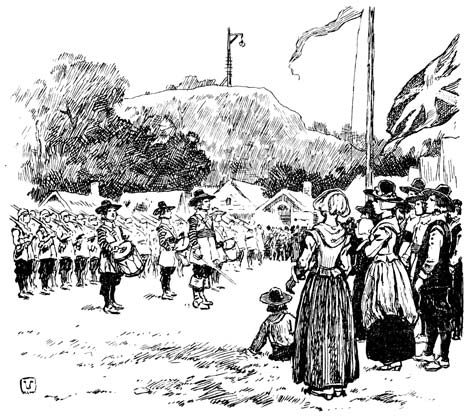
When Master Cotton was done with praying, the soldiers began to march here and there in many ways, until one's eyes were confused with watching them, and then came the volleys, as the men shot straight over the heads of the people; but father says no one need fear such warlike work, for there were no bullets in the guns.
Of course I understood that he must needs know whether this be true or not, else he would not have 149 spoken it; and yet I could not but shudder when so many guns were fired at one time, while the smoke of powder in the air was most painful to the eyes.
After the soldiers had marched back and forth in the most ferocious manner possible until noon, they were allowed a time for rest, and then it was that those who had set up tents, entertained their friends at table with stores upon stores of dainties of every kind.
I have heard that Sir Harry Vane declared our soldiers presented a very fine front, whatever that may be, and he is not backward about saying that even the King himself has no more warlike appearing men in his army. All of which is surely true, for Sir Harry, being the son of a Privy Councilor, must have seen His Majesty's troops many a time.
After all the people had feasted, each in his own fashion, and the soldiers had been refreshed at the expense of the town, the marching was begun again, to be continued in a manner like to make one's head swim, until the Governor gave the signal that the shooting at a target might commence, when it was that the guns were loaded with real bullets.
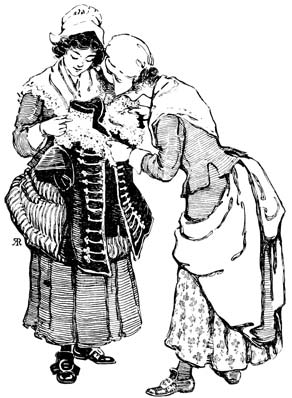
On this day it was Sir Harry who gave the prize to be shot for, which was a doublet of velvet trimmed 150 with lace, the value of which, so father declares, is not less than five times as great as any prize that has ever been offered on Training Day in Boston.
Susan and I were eager to know who won it; but before the matter was settled, my mother insisted it was time for us to go home, because of the behavior of some of the soldiers' being none of the best after they have done with the training.
However, we saw the doublet, and marked well the pattern of the lace, therefore if the winner wears it on the street, there will be no question as to our knowing it again.
The training was a most enjoyable spectacle, even though Susan and I were so frightened at times that it seemed as if our hearts were really in our mouths, and when we followed mother home on that afternoon, it was with the belief that our town of Boston, although 151 not as old as Jamestown, Plymouth or Salem, had grown, both in numbers and fashion, far beyond any other settlement in this New World.
My mother believes it would be better if Training Day were done away with entirely, for she says we spend far too much time in the pursuit of frivolity, when we have no less than one lecture day in each week. It must be that she is in the right, for father has much the same opinion, and declares a stop must be put to so many lectures, which but gives a convenient excuse for indolent people, who should be at work on the plantations or in the houses, to go gadding about the town.
You must know that Thursday is the day when we listen to lectures by some of the preachers, or those among the magistrates who have the gift of speech, and this has been the custom since the first year we came here.
In the early days the lecture hour was in the forenoon; but at the end of three years, after Boston was become a town, those in authority over us passed a law that the lecture should not begin until one of the clock in the afternoon, and this was done in order that the people might not have an excuse to spend the entire day in idleness. 152
I cannot see, however, that any more work is done on Thursdays now than before the law was made, for as soon as breakfast is finished and the houses have been set in order, nearly every one walks on the streets, this pleasure being forbidden on Sabbath days, until it is time to gather at the church.
Our magistrates also tried to make the rule that no minister, or other person, should lecture more often than once in every two weeks, in order that we might have less of such diversion; but no heed is given to this law, for I myself have heard Master Cotton speak to the people no less than twice on every Thursday, and this in addition to lectures by other preachers.
If father were one of the magistrates, mother would do all she might to have the hour of the meetings set back to the morning, for she believes it is wrong to make of the forenoon a time for the punishing of evil-doers, as has come to be the custom.
Now, when we go out to mingle with the people, it is impossible not to stop here or there when one of the constables is whipping an idle fellow through the streets, laying the lashes on his bare back with such force that the blood follows nearly every blow.
Then again, it is not often that one can pass the post 153 at the corner of Prison Lane, without seeing some wrong-doer chained there as punishment for striking one of the people, and the cage wherein are kept men and women who have offended against the laws is seldom empty on a Thursday.
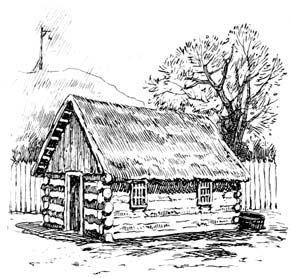
The prison itself is a dreary looking place, although it is not quite so very different from the church, but somehow its barred windows make the shivers run up and down my back and I always hurry past it with as much speed as possible.
Most likely there are as many bad people in the other towns of this New World, as in Boston; but it surely seems to Susan and me as if we had among us all those in America who delight in breaking the laws.
Of all the punishments which are inflicted here, I think the most cruel is that of sentencing a man to wear, so long as he may live, a halter around his neck so that every one may see it, for thus is the wrong-doer forced to shame himself during every hour of the day, and especially on Thursdays, when he must stand not 154 less than two hours during the forenoon on the steps of the church.
It is on lecture day that one may see the latest notices put up on the church, together with the announcements of those who intend to be married, and Susan and I have great pleasure in reading these, for then are we aware of anything important about to take place.
Of course there are times when we are not so well pleased at being forced to sit still five or six long hours, listening to this preacher or that who feels a call to speak during the lecture time; but if we failed to do so, we should not be allowed to go on the street wheresoever we please, therefore I hope that mother will not be able to have the lecture hour changed to the morning.
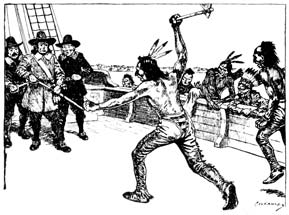
It was six years after we had come to live in Boston, that a most terrible crime was committed by the savages of the Narragansett tribe, for then they killed Captain John Oldham, and three other men, who were sailing on Long Island Sound. The vessel 155 was taken by the Indians, after they had murdered all on board, and we in Boston were moved to great fear, believing the brown men around us were making ready to murder the white people.
Sir Harry Vane, the Governor, sent five of our chief men to the head savage of the Narragansett tribe, to inquire into the matter, and these messengers were told that none save the Indians living on Block Island had any hand in the matter.
Then it was that Governor Vane commanded Master Endicott of Salem, to take a large number of fighting men in three vessels, and punish the murderers as they deserved.
Master Endicott did according to the command; but when he was come to Block Island, the brown people had run away; therefore all he could do was to burn the huts, destroy the canoes, and shoot the dogs that were prowling around the deserted village.
This Master Endicott did not believe was punishment enough for what had been done, therefore he crossed over to the mainland where the Indians who call themselves Pequots live, and there he killed more than twenty of these people, besides seizing their corn. He also burned, or destroyed in some other way, all the goods belonging to the savages that he could find, and then came back to Boston, where the people of the town turned out to give him a noble welcome. 156
We had a thanksgiving day because of what had been done, and believed, or, at least, Susan and I did, that we need fear nothing more from the savages, for surely the brown people would not dare molest any white man again after being so severely punished.
It was not many days, however, before word was brought to Boston that the Pequot Indians were trying to coax the Narragansett savages to join them in killing every Englishman that could be found in the land.
Father had said that this might be done, if the brown people all over the country should come together, and we who lived in Boston and Salem were in great fear.
The soldiers were called together from every village. The gates of the fort on the Neck were kept closed, with men stationed there night and day to see that no enemy came through, and the preachers prayed most fervently that our lives might be spared because of our doing our utmost to serve God as He would have us.
Then it was that the Lord heard our prayers, else had we all been killed, and it was brought about in a way such as, my mother said, heaped coals of fire upon our heads.
The same Master Roger Williams who had been 157 driven out into the wilderness, because of holding a belief contrary to ours, and who had lived with the Narragansett Indians since then, so pleaded with the savages of the tribe that they sent some of their chief people to Boston, with promises of friendliness.
Sir Harry Vane received the visitors with great state. All our soldiers were paraded through the streets, and in front of the Governor's house. The drummers marched to and fro making music, and the people came out on the streets that the Indians might believe we had not been afraid.
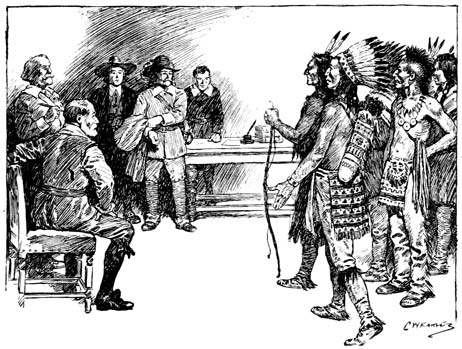
It was much like Training Day, save that only the magistrates of the town were allowed to know what was being done in the Governor's house after the savages 158 had gone into the building, decked out in a brave array of feathers, and in clothing embroidered with fanciful colored quills of porcupines, and with their faces painted in a most hideous fashion.
We were told, after the Indians had marched out of the town, near to sunset, one behind the other in a manner as solemn as if they were coming from church, that the tribe of Narragansett savages had promised to aid us white people against the brown men of the Pequot tribe, in every way possible, and greatly did we rejoice that night, for it seemed as if all trouble had passed.
The Englishmen who had settled in the colony known as Connecticut, soon found that the Pequot savages could do much of wickedness, even though the Narragansetts had said they would be friends with the white people, for within a very short time after Master Roger Williams had sent the Indians to us in peace, did a season of murder begin.
Because of my being a girl, who is not supposed to understand affairs of state, and who could only cower in fear and trembling by the side of her mother when word was brought of the dreadful deeds done by the Pequot savages, I shall not set down anything whatsoever 159 concerning that terrible winter, when we heard nothing save stories of blood and direst suffering.
No one could say whether, despite all Master Roger Williams might be able to do, the savages nearabout would not fall upon us of Boston as they had upon the white people of Connecticut, and, therefore, as soon as the shadows of evening had begun to gather, we girls sought the protection of our mothers.
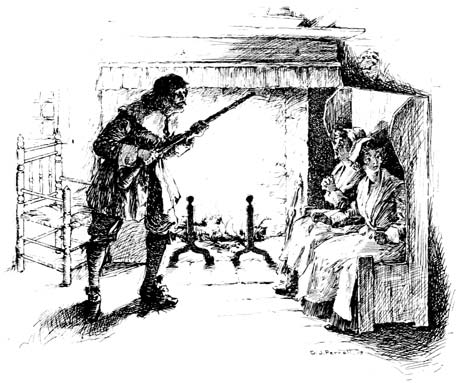
Seated before the roaring fires, not daring to move about the house even after the doors and shutters were securely barred, we started in alarm at every sound, hearing in the roaring of the wind, or the crackling of 160 the fire, some token that the brown people were skulking around striving to get inside that they might shed our blood.
It was far worse than the time of the famine, for then we knew just what might come to us, and if death entered the house, we would meet it in the arms of those we loved; but from all which had been told by those affrighted people who came to us from Connecticut, we realized that horrors such as could not even be imagined, would be upon us with the coming of those savages who had sworn to make an end of the white settlers in the New World.
It is not well even that I set down in words the distress of mind which was ours during that long dreadful winter; but this I may say in all truth, as the parting word, that nowhere in the Massachusetts Bay Colony could have been found a more distressed or unhappy girl, than this same Ruth of Boston.